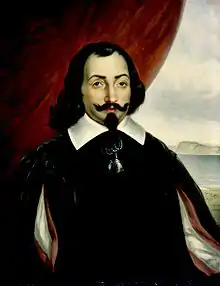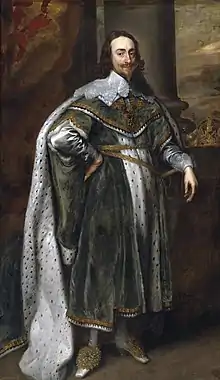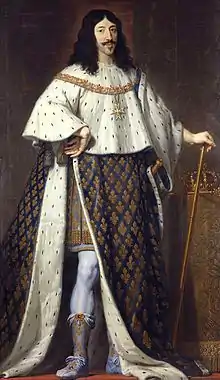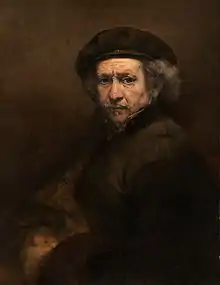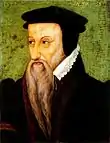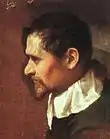1600s (decade)
The 1600s ran from January 1, 1600, to December 31, 1609.
| Millennium: | 2nd millennium |
| Centuries: | |
| Decades: | |
| Years: | |
| Categories: |
|
Events
1600
January–June
- January 1 – Scotland adopts January 1 as New Year's Day instead of March 25.
- January
- Hugh O'Neill, 2nd Earl of Tyrone, renews the Nine Years' War (Ireland) against England with an invasion of Munster.[1]
- Sebald de Weert makes the first definite sighting of the Falkland Islands.
- February 17 – On his way to be burned at the stake for heresy in Rome, Giordano Bruno has his tongue "imprisoned" after he refuses to stop talking.[2]
- February 19 – Huaynaputina volcano in Peru undergoes a catastrophic eruption, the worst to be recorded in South America.
- March 20 – Linköping Bloodbath: Five Swedish nobles are publicly executed by decapitation and Polish–Swedish King Sigismund III Vasa is de facto deposed as ruler of Sweden.
- April 19 – The first Dutch ship ever to arrive in Japan, the Liefde ("Love"), anchors in Sashifu, in the Bungo Province (modern-day Usuki in Ōita Prefecture). The sailors present on this ship are William Adams, Jan Joosten van Lodensteijn, Jacob Quaeckernaeck and Melchior van Santvoort.
- May 27 – Michael the Brave becomes ruler of Wallachia, Transylvania and Moldavia, formally uniting the three Danubian Principalities under one Romanian ruler.
July–December
- July 2 – Eighty Years' War (Dutch War of Independence) – Battle of Nieuwpoort: The Dutch Republic gains a tactical victory over the Spanish Empire.[3]
- August 5 – The brothers Alexander Ruthven and John Ruthven, 3rd Earl of Gowrie, are killed during a failed attempt to kidnap or murder King James VI of Scotland at their home.
- Autumn
- Thessaly rebellion: Greeks in Thessaly, incited by Bishop Dionysios Skylosophos, attempt to rebel against the Ottoman Empire.
- A Persian embassy arrives in Prague and meets with Rudolf II, Holy Roman Emperor.
- October 6 – Première of Jacopo Peri's Euridice, the earliest known fully surviving work of modern opera, produced by Emilio de' Cavalieri for the wedding of Henry IV of France and Maria de' Medici in Florence.[4]
- October 21 – Battle of Sekigahara in Japan: Tokugawa Ieyasu gains nominal control over the whole country.
- December 31 – The East India Company is granted a Royal Charter in the Kingdom of England for trade with Asia.
Date unknown
- Approximate date – The Lutheran orthodox campaign intensifies, to reinforce the Book of Concord.
- Caister Castle in England falls into ruin.
- Sumo wrestling becomes a professional sport in Japan.
- William Shakespeare's plays Henry IV, Part 2, Henry V, The Merchant of Venice, A Midsummer Night's Dream and Much Ado About Nothing are published in London.[1]
- William Gilbert publishes De Magnete, one of the first significant scientific books published in England, describing the Earth's magnetic field, and the beginning of modern geomagnetism.
- Fabritio Caroso's dance manual Nobiltà de dame is published.
1601
January–June
- January 11 – Valladolid is briefly the capital of Habsburg Spain under Philip III, before returning indefinitely to Madrid in 1606.
- January 17 – Treaty of Lyon: France gains Bresse, Bugey and Gex from Savoy, ceding Saluzzo in exchange.
- February 8 – Robert Devereux, 2nd Earl of Essex, longtime favourite of Queen Elizabeth I of England, rebels against the queen; his revolt is quickly crushed.[5]
- April 22 – The first expedition of the East India Company sets sail from England for the Spice Islands with John Davis as pilot-major.[6]
- Spring – Possible first performance of William Shakespeare's tragedy Hamlet.[7][8]
July–December
- December 24 (Julian calendar, used by the English; January 3, 1602, according to the Gregorian calendar used by the Irish and Spanish forces in the battle) – The Battle of Kinsale ends the siege of Kinsale, Ireland (begun in autumn 1601).
Date unknown
- Dutch troops attack the Portuguese in Malacca.
- Jesuit Matteo Ricci becomes the first European to enter the Forbidden City in Beijing, China, being invited by the Ming Dynasty Emperor.
- A rainy summer in the Tsardom of Russia causes a bad harvest, leading to the Russian famine of 1601–03 which kills about two million people.
- Martin Möller is accused of Crypto-Calvinism.
1602
January–June
- January 3 – Battle of Kinsale: The English defeat Irish rebels and their Spanish allies. (The battle happens on this date according to the Gregorian calendar used by the Irish and Spanish but on Thursday, 24 December, 1601 according to the old Julian calendar used by the English.)
- February 2 (Candlemas night) – First known production of William Shakespeare's comedy Twelfth Night, in London.[9]
- March 20 – The United East India Company is established by the United Provinces States-General in Amsterdam, with the stated intention of capturing the spice trade from the Portuguese.
- April 20 – The Danish–Icelandic Trade Monopoly is established by the Danish Monarch, in light of recently implemented absolutism.
- May 15 – English explorer Bartholomew Gosnold, sailing in the Concord, becomes the first European at Cape Cod.
- June – James Lancaster's East India Company fleet arrives at Achin (modern-day Aceh), Sumatra to deal with the local ruler. Having defeated Portugal's ally, the ruler is happy to do business, and Lancaster seizes a large Portuguese galleon and loots it.
July–December
- October 3–4 – Battle of the Narrow Seas: an English fleet, joined by the Dutch, pursues six Spanish galleys through the Strait of Dover.
- November 8 – The Bodleian Library at the University of Oxford in England is opened.[7]
- December 11 – A surprise attack by forces under the command of Charles Emmanuel I, Duke of Savoy, and his brother-in-law, Philip III of Spain, is repelled by the citizens of Geneva (this actually takes place after midnight, in the early morning of December 12, but commemorations/celebrations on Fête de l'Escalade are usually held on December 11 or the closest weekend).
Ongoing
- Russian famine of 1601–03
- Long Turkish War (1591/1593-1606)
- Jelali revolts
Date unknown
- The Portuguese are expelled from Bahrain.
- The Safavid Empire of Persia and the Spanish Empire conclude a defensive alliance and declare war on the Ottoman Empire.
- A private trading company is established in Copenhagen with a monopoly on the trade with Iceland.
- Ben Jonson's satirical comedy Poetaster is first performed, in London.
- William Shakespeare's comedy The Merry Wives of Windsor is published.
- The play A Larum for London, or the Siedge of Antwerp is published in London.
- Copies are printed of the geographical map of East Asia created by Matteo Ricci, an Italian Jesuit stationed in Ming dynasty Beijing, China, with Chinese-written labeling and map symbols.
- The iconoclast and Confucian scholar Li Zhi commits suicide while in a Chinese prison, during the late Ming dynasty; he had taught that women were the intellectual equals of men and should be given equal opportunity in education; he was charged with spreading "dangerous ideas".
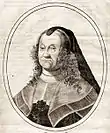
Countess Amalie Elisabeth of Hanau-Münzenberg born 29 January
January–June
- February 25 – Dutch–Portuguese War: the Portuguese ship Santa Catarina is seized by Dutch East India Company ships off Singapore. The first permanent Dutch trading post in Indonesia is established in Banten.
- March – French explorer Samuel de Champlain sails to Canada.
- March 24
- Queen Elizabeth I of England dies at Richmond Palace (having ruled since 1558), and is succeeded by her cousin twice removed, King James VI of Scotland (where he has ruled since 1567), uniting the crowns of Scotland and England.[10]
- Tokugawa Ieyasu is granted the title of shōgun from Emperor Go-Yozei, and establishes the Tokugawa shogunate in Edo, Japan. The 265-year-long Edo period begins.
- March 30 – The Nine Years War (Ireland) is ended by the submission of Hugh O'Neill, Earl of Tyrone, to the English Crown, and the signing of the Treaty of Mellifont.
- April 28 – The funeral of Elizabeth I of England is held in Westminster Abbey.[11]
July–December
- July 17 or July 19 – Sir Walter Raleigh is arrested for treason.[12]
- July 25 – James I is crowned as King of England in Westminster Abbey.[10] Ceremonies are limited because of plague.
- August 17 – The Accademia dei Lincei, the oldest scientific academy in the world, is founded in Rome by Federico Cesi.
- September 20 – Samuel Champlain arrives back in France.[13]
- October – The Sangley Rebellion takes place, ending in the massacre of 20,000 Sangley Chinese in Manila.[14]
- November – Rokugō rebellion: More than 1,000 rōnin rebel in support of their exiled lord, Onodera Yoshimichi, in Japan.[15]
- November 17 – Sir Walter Raleigh goes on trial for treason, in the converted Great Hall of Winchester Castle.[10] He is found guilty, but his life is spared by King James I at this time, and he is returned to imprisonment in the Tower of London.
- December 22 – Ottoman dynasty: Sultan Mehmed III of the Ottoman Empire dies, and is succeeded by his son Ahmed I.
Ongoing events
- Russian famine of 1601–1603.
Date unknown
- A rebellion breaks out in Transylvania.
- French Huguenot Pierre de Gua is granted royal permission to settle in North America, founding the colony of Acadia.
- Yaqob is deposed as Emperor of Ethiopia for the first time by Za Sellase, who appoints his cousin Za Dengel to replace him.
- Johann Bayer publishes the star atlas Uranometria, the first to cover the entire celestial sphere.[16]
- The earliest of eight companies that will eventually merge to form the Kikkoman Corporation, the producers of soy sauce, is founded in Japan.
1604
January–June
- January 1 – The Masque of Indian and China Knights is performed by courtiers of James VI and I at Hampton Court.[17]
- January 14 – The Hampton Court Conference is held between James I of England, the Anglican bishops and representatives of the Puritans. Work begins on the Authorized King James Version of the Bible[7] and revision of the Book of Common Prayer.
- June – Ottoman–Safavid War (1603–18): Shāh Abbas I of Persia's Safavid army captures the city of Yerevan from the Ottoman Empire after a siege. At this time the Shāh begins the expulsion of Armenians from Jolfa to New Julfa in his capital of Isfahan; more than 25,000 die during the exodus.
- August 18 – England concludes the Treaty of London with Spain, ending the Anglo-Spanish War (1585–1604), an intermittent conflict within the Eighty Years' War.[18]
July–December
- September 1 – Sri Guru Granth Sahib, the religious text of Sikhism, whose compilation by Guru Arjan was completed on August 29, is installed at Harmandir Sahib in Amritsar.
- September 20 – After a bloody three-year siege. Ostend is finally captured by Spanish forces under Ambrogio Spinola
- October 4 – Za Dengel, Emperor of Ethiopia, is killed in battle with the forces of Za Sellase, who restores his cousin Yaqob to the throne.
- October 9 – The supernova which becomes known as Kepler's Supernova (SN 1604) is first observed from the northern parts of the Italian Peninsula. From October 17, Johannes Kepler begins a year's observation of it from Prague. There won't be another "naked-eye" supernova to be seen until 1987. As of 2021, this is the last supernova to be observed in the Milky Way.[19][20]
- November 1 – First recorded performance of William Shakespeare's tragedy Othello, at the Palace of Whitehall in London.
- December 26 (St. Stephen's night) – First recorded performance of Shakespeare's problem play Measure for Measure, before King James I of England in the banquet hall of the Palace of Whitehall.[21]
- December 29: An 8.1 earthquake shakes the Taiwan Strait leaving several dead.
Date unknown
- France begins settling Acadia, first successful French North American colony.
- Before 1 October, Huntingdon Beaumont completes the Wollaton Wagonway, built to transport coal from the mines at Strelley to Wollaton just west of Nottingham, England, the world's oldest wagonway with provenance.[22]
- The Table Alphabeticall, the first known English dictionary to be organized by alphabetical ordering, is published.
- First publication of Christopher Marlowe's play The Tragical History of Doctor Faustus, in London.
- Lancelot de Casteau's L'Ouverture de cuisine published in Liège, including the first printed recipe for choux pastry.
Religion
- According to legend, the vault of Christian Rosenkreuz is discovered.
- The Papacy is expected to fall this year by Tobias Hess and Simon Studion according to their correspondence in 1597.
1605
January–June
- January 16 – The first part of Miguel de Cervantes' satire on the theme of chivalry, Don Quixote (El ingenioso hidalgo don Quixote de la Mancha, "The Ingenious Hidalgo Don Quixote of La Mancha"), is published in Madrid. One of the first significant novels in the western literary tradition, it becomes a global bestseller almost at once.[23]
- March 11 – A proclamation declares all people of Ireland to be the direct subjects of the British Crown and not of any local lord or chief.[24]
- April 1 – Pope Leo XI succeeds Pope Clement VIII, to become the 232nd pope, as a result of the heated Papal conclave of March 1605.[25]
- April 8 – The city of Oulu (Swedish: Uleåborg) was founded by King Charles IX of Sweden.[26]
- April 13 – Tsar Boris Godunov dies; Feodor II accedes to the Russian throne.
- April 16 – In England, John Winthrop, later governor of the future Massachusetts Bay Colony, marries his first wife (of 4), Mary Forth, daughter of John Forth, of Great Stambridge, Essex.
- May 16 – Pope Paul V succeeds Pope Leo XI as the 233rd pope, making this the last Year of Three Popes until 1978. He is elected as a compromise candidate after the Papal conclave of May 1605 leads to physical assault.[27]
- June 1 – Russian troops in Moscow imprison Feodor II and his mother, later executing them.
- June 20 – Pretender Dmitriy and his supporters, including troops of the Polish–Lithuanian Commonwealth, march to Moscow.[28]
July–December
- July 4 – A proclamation commands all Roman Catholic seminary priests and Jesuits to leave Ireland by December 10 and directs the laity to attend Church of Ireland services.[24]
- July 13 - A 7.5 earthquake strikes China's Hainan Province causing widespread damage and thousands of deaths.
- July 21 – Pretender Dmitriy is officially crowned Tsar Dimitriy Ioannovich of Russia in Moscow by Patriarch Ignatius.
- September 27 – Swedish armies are decisively defeated by Polish–Lithuanian Commonwealth cavalry in the Battle of Kircholm.
- October
- First publication of Relation aller Fürnemmen und gedenckwürdigen Historien by Johann Carolus in Strasbourg (Holy Roman Empire), generally regarded as the world's first newspaper.[29] De Nieuwe Tijdinghen, a Dutch proto-newspaper, is also published this year.
- Francis Bacon's Of the Proficience and Advancement of Learning, Divine and Human is published in London.
- October 27 – The 3rd Mughal Emperor, Akbar "the Great" dies of dysentery at Fatehpur Sikri in India.
- October 28 – Eighty Years' War: Spanish troops under Ambrogio Spinola, 1st Marquess of Los Balbases, Captain-General of the Army of Flanders (newly appointed a Knight of the Order of the Golden Fleece), occupy Wachtendonk after a 20-day siege.
- November 3 – The 4th Mughal Emperor Jahangir begins his 22-year reign over the Mughal Empire.
- November 5 – Gunpowder Plot: A plot to blow up the English Houses of Parliament is foiled when, following a tip-off, Sir Thomas Knyvet, a justice of the peace, finds Catholic plotter Guy Fawkes in a cellar below the Parliament building and orders a search of the area. 36 barrels of gunpowder are found and Fawkes is arrested for trying to kill King James I of England and the members who are scheduled to sit together in Parliament the next day.[30]
Date unknown
- Tokugawa Ieyasu abdicates as shōgun of Japan, becoming Ogosho (retired shōgun). His son Tokugawa Hidetada succeeds him to the office.
- Habitation at Port-Royal established by France under Pierre Dugua, Sieur de Mons, the first European colonization of Nova Scotia in North America (at this time part of Acadia); the Gregorian calendar is adopted.
- Crew of the Olive become the first English visitors to Barbados.
- Refugee French Huguenot merchants begin to settle in Dublin and Waterford.[31]
- The Priory of St. Gregory's is founded at Douai, Flanders, at this time in the Spanish Netherlands, by its first prior, John Roberts, and other exiles, thus becoming the first English Benedictine house to renew conventual life after the English Reformation. More than two centuries later the community will establish Downside Abbey back in England.
- The Irish College in Paris is co-founded by John Lee, an Irish priest, and John de l'Escalopier, President of the Parlement.
- Central Mexico's Amerindian population reaches one million.
1606
January–June
- January 24 – Gunpowder Plot: The trial of Guy Fawkes and other conspirators, for plotting against Parliament and James I of England, begins.[32]
- January 29 – Pedro Fernandes de Queirós discovers the Pitcairn Islands.
- February 9 – Pedro Fernandes de Queirós discovers Mehetia.
- February 12 – Pedro Fernandes de Queirós discovers Tauere atoll.
- February 26 – Dutch navigator Willem Janszoon makes the first confirmed sighting of Australia by a European.
- March – The Duke of York's ship Duyfken, under Captain Willem Janszoon, explores the western coast of Cape York Peninsula.[33]
- March 19 – Ferdinando I de' Medici, Grand Duke of Tuscany, in the Fortezza Vecchia Chapel of Saint Francesco, elevates Livorno to the rank of city.
- April – Venetian Interdict: Pope Paul V places the Republic of Venice under an interdict.
- April 10 – Charter of 1606: The First Charter of Virginia is adopted, by which King James I of England grants rights to the Virginia Company (comprising the London Company and Plymouth Company) to settle parts of the east coast of North America.
- April 12 – The first version of the Union Flag is created,[10] to be worn as a national flag by English and Scottish ships.
- May – Pedro Fernandes de Queirós discovers the islands of Vanuatu; believing them to be Australia, he names them La Austrialia del Espiritu Santo.[34]
- May 17 – Supporters of Vasili Shuisky invade the Kremlin, and kill Tsar Dmitry I of Russia.
- June or October – Battle of Cape St. Vincent: An improvised Spanish fleet under Luis Fajardo defeats the Dutch fleet under Willem Haultain.
July–December
- August (approx.) – Possible first performance of William Shakespeare's tragedy Macbeth in London.[35][7]
- August 16 – Battle of Cape Rachado: A Dutch fleet is defeated by the Portuguese.
- October – Luís Vaz de Torres is the first European to sail through the Torres Strait.
- October 2 – King Charles IX of Sweden founded the city of Vaasa to the Korsholm Parish in the Coastal Ostrobothnia.[36]
- September 20 – The trial in the gravedigging scandal of Frankenstein begins.
- November 11 – The Peace of Zsitvatorok is signed, between the Ottoman and Holy Roman Empires. The independence of Transylvania is recognized by both sides, and Austria's annual tribute to the Ottomans is abolished.
- December 19 – The Susan Constant sets out from the River Thames in England leading the Virginia Company's fleet for the foundation of Jamestown, Virginia.[37]
Date unknown
- A storm buries the village of St Ismail near modern-day Kidwelly, Carmarthenshire, Wales.[38]
- The Jesuit Joannis Stribingius visits Latvia, and describes Latvian mythology.
- The Evangelic Lyceum (Evanjelické lýceum), a Lutheran high school is founded in Bratislava.
- Gregor Richter succeeds Martin Möller as the chief pastor of Görlitz.
- The cryptographic text Steganographia, written by Johannes Trithemius c.1499, is published in Frankfurt.
1607
January–June
- January 13 – The Bank of Genoa fails, after the announcement of national bankruptcy in Spain.
- January 19 – San Agustin Church, Manila, is officially completed; by the 21st century it will be the oldest church in the Philippines.
- January 30 – A massive wave sweeps along the Bristol Channel, possibly a tsunami, killing 2,000 people.[39]
- February 24 – Claudio Monteverdi's L'Orfeo, the earliest fully developed opera in the modern-day repertoire, premieres at the Ducal Palace of Mantua.[40]
- March 10 – Battle of Gol in Gojjam: Susenyos defeats the combined armies of Yaqob and Abuna Petros II, which makes him Emperor of Ethiopia.
- April 25 – Battle of Gibraltar: A Dutch fleet destroys a Spanish fleet anchored in the Bay of Gibraltar.[41]
- April 26 – English colonists make landfall at Cape Henry, Virginia, later moving up the James River.
- May 14 – Jamestown, Virginia, is established as the first permanent English settlement in North America, beginning the American frontier.
- May 15 – Jamestown: Christopher Newport, George Percy, Gabriel Archer, and others travel six days exploring along the James River up to the falls and Powhatan's village.
- May 26
- Jamestown: The president directs the fort to be strengthened and armed against the many attacks of the natives: "Hereupon the President was contented the Fort should be pallisadoed, the ordinance mounted, his men armed and exercised, for many were the assaults and Ambuscadoes of the Savages ..." [John Smith, Proceedings (Barbour 1964)]
- 200 armed Indians attack the Jamestown settlement, killing two and wounding ten.
- May 28 – Jamestown: The Fort is pallisadoed: "we laboured, pallozadoing our fort" [Gabriel Archer (Arber)].
- June 5 – John Hall marries Susanna, daughter of William Shakespeare.
- June 8 – Newton rebellion: The Tresham landowners family kills 40–50 peasants, during protests against the enclosure of common land in Newton, Northamptonshire, England, at the culmination of the Midland Revolt.
- June 10 – Jamestown: Captain John Smith is released from arrest and sworn in as a member of the colony Council.
- June 15 – Jamestown: The triangular fort is completed and armed: "The fifteenth of June we had built and finished our Fort, which was triangle wise, having three Bulwarkes, at every corner, like a halfe Moone, and foure or five pieces of Artillerie mounted in them. We had made our selves sufficiently strong for these Savages. We had also sowne most of our Corne on two Mountaines." [George Percy (Tyler 1952:19)]
- June 22 – Christopher Newport sails back to England.
- June 27 – Jamestown: The colony bears extreme toil in strengthening the fort [from John Smith, Proceedings (Barbour 1964:210)].
July–December
- August 13 – The ship Gift of God of the Plymouth Company arrives at the mouth of the modern-day Kennebec River in Maine. English colonists establish Fort St. George, also known as the Popham Colony. The settlement lasts little more than a year, before residents return to England in the first oceangoing ship built in the New World, a 30-ton pinnace called The Virginia.
- September 5 – Hamlet is performed aboard the East India Company ship Red Dragon, under the command of Capt. William Keeling, anchored off the coast of Sierra Leone, the first known performance of a Shakespeare play outside England in English, and the first by amateurs.
- September 10 – Jamestown President Edward Maria Wingfield is deposed, and John Ratcliffe elected.
- September 14 – Flight of the Earls: Hugh O'Neill, 2nd Earl of Tyrone, and Rory O'Donnell, 1st Earl of Tyrconnell, flee Ireland for Spain with 90 followers, to avoid capture by the English crown, never to return.
- October 27 - Halley's Comet is seen by Johannes Kepler
- September – The Scrooby Congregation of Protestant English Separatists attempt to flee to the Dutch Republic from Boston, Lincolnshire, but are betrayed, arrested and imprisoned for a time.
- December (early) – Captain John Smith of the Jamestown Colony is captured by Opchancanough, and then sent to Chief Powhatan for execution; Pocahontas rescues him.
Date unknown
- Spain is effectively bankrupt.
- The rule of Andorra passes jointly to the king of France, and the Bishop of Urgell.
- In the Midland Revolt against Enclosures in England, the term Levellers is first used.
- Missionary Juan Fonte establishes the first Jesuit mission among the Tarahumara, in the Sierra Madre Mountains of Northwest Mexico.
January–June
- January – In the Colony of Virginia, Powhatan releases Captain John Smith.
- January 2 – The first of the Jamestown supply missions returns to the Colony of Virginia with Christopher Newport commanding the John and Francis and the Phoenix bringing about 100 new settlers to supplement the 38 survivors he finds at Jamestown.
- January 7 – At Jamestown, Virginia, fire destroys "all the houses in the fort"; the fort is repaired in March.
- January 17 – Emperor Susenyos I of Ethiopia defeats an Oromo army at Ebenat; 12,000 Oromo are reportedly killed at a cost of 400 Amhara.
- January 23 – Treaty of The Hague, a defensive alliance between France and the United Provinces of the Netherlands, is signed.[42]
- March 18 – Susenyos is formally crowned Emperor of Ethiopia, at the ancient city of Axum.[43]
- April 10 – Jamestown supply missions: Christopher Newport again sails for England, carrying Powhatan's tribesman Namontack for a visit to London.
- April 19 – The Burning of Derry launches O'Doherty's Rebellion in the Kingdom of Ireland.
- April 20 – Old Bushmills Distillery is first licensed to distil whiskey at Bushmills, County Antrim, Ireland by King James I.
- May 8 – A newly nationalized silver mine in Scotland at Hilderston, West Lothian is re-opened by Bevis Bulmer.[44]
- May 14 – The Protestant Union is founded in Auhausen.
July–December
- July 3 – The settlement of Quebec City is founded by Samuel de Champlain.[45]
- August 24 – The first official English representative to India, Captain William Hawkins, lands at Surat.
- September 10 – John Smith is elected council president of Jamestown, and begins expanding the fort.
- September 21 – The University of Oviedo in Spain is founded.
- October 1 – The second of the Jamestown supply missions, which set out in July from England, arrives at Jamestown, Virginia, with Christopher Newport commanding the Mary and Margaret carrying 70 settlers, bringing the population back up to 120; the passengers include two women and some skilled artisans, mostly from continental Europe, to develop industries.[46]
- October 2 – Dutch lens maker Hans Lippershey demonstrates the first telescope in the Dutch Parliament.
- December – Jamestown supply missions: Christopher Newport returns from Jamestown to England carrying cargo with "tryals of Pitch, Tarre, Glasse, Frankincense, Sope Ashes ..."
Date unknown
- Spring – The Scrooby Congregation of Protestant English Separatists successfully flees to the Dutch Republic from the Humber, origin of the Pilgrim Fathers who in 1620 move on to North America.
- The first cheques are used in the Dutch Republic.
- The Uniform Land-Tax Law is imposed in Korea.
- Five royal schools in Ulster are given a Royal Charter by King James I.
1609
January–June
- January – The Basque witch trials begin.
- January 15 – One of the world's first newspapers, Avisa Relation oder Zeitung, begins publication in Wolfenbüttel (Holy Roman Empire).[47]
- January 31 – The Bank of Amsterdam is established.
- February 4 – The last day of Keichō 慶長 13 (according to the Japanese lunar calendar).
- March – Hugo Grotius publishes Mare Liberum, his legal text on freedom of the seas, in Leiden.
- April 4
- King Philip III of Spain signs an edict to expel of all Moriscos from his country (see September 11).
- English explorer Henry Hudson, in the service of the Dutch East India Company, sets out from Amsterdam in the Halve Maen.[48]
- April 5 – Invasion of Ryukyu in Japan: Soldiers of the Shimazu clan capture the castle on Ryukyu Island, beginning to make the Ryukyu Kingdom a vassal of Satsuma Han. But Ryukyu was still allowed to keep itself a tribute state of Ming dynasty and Qing dynasty.
- April 9 – Treaty of Antwerp: The Netherlands and Spain agree to the Twelve Years' Truce (1609–1621) in the Eighty Years' War, allowing the Dutch East India Company to trade within the Spanish Empire.
- May 20 – London publisher Thomas Thorpe issues Shake-speares Sonnets, with a dedication to "Mr. W.H.", and the poem A Lover's Complaint appended; it is uncertain whether this publication has Shakespeare's authority.
- May 23 – The Second Virginia Charter is officially ratified; it is intended to replace the council with a governor, who has absolute control in the colony.
July–December
- July – Samuel de Champlain claims the Lake Champlain area of Vermont, for the Kingdom of France.
- July 9 – Bohemia is granted freedom of religion (Letter of Majesty).
- July 10 – The German Catholic League is formed to counteract the Protestant Union.
- July 23 – A hurricane at sea separates the nine London Company's ships (600 more settlers) en route to relieve the Jamestown settlement; one ship sinks, and the Sea Venture is driven ashore at Bermuda on July 25, thus effectively first settling the colony.
- July 30 – At what is now Crown Point, New York, Samuel de Champlain participates in a battle between the Huron and Iroquois, shooting and killing two Iroquois chiefs; this helps set the tone for French–Iroquois relations for the next 100 years.
- August 25 – Galileo Galilei demonstrates his first telescope to Venetian officials.[49]
- August 28 – Henry Hudson is the first European to see Delaware Bay.[48][1]
- August – Seven ships arrive at the colony of Jamestown, Virginia, with 200–300 men, women, and children, reporting the Sea Venture wrecked near Bermuda.
- September 2 – Henry Hudson enters New York Bay, aboard the Halve Maen.
- September 10 – Jamestown: Capt. George Percy replaces Captain John Smith as president of the Council, and Smith returns to England.
- September 11 – Valencia expels all the Moriscos (see April 4).
- September 11–12 – Henry Hudson in the Halve Maen sails into Upper New York Bay,[50] and begins a journey up the Hudson River.[51]
- October 12 – A version of the rhyme Three Blind Mice is published in London.[52] The editor, and possible author of the verse, is the teenage Thomas Ravenscroft.[53]
Date unknown
- The Dutch East India Company imports tea to Europe.
- The Dutch East India Company establishes a trading post in Hirado, Japan.
- The Scrooby Congregation of Protestant English Separatists (predecessors of the Pilgrim Fathers) moves from Amsterdam to Leiden.
- Warsaw becomes the capital of Poland.[54]
- The municipality of Buenavista in Marinduque, Philippines is founded.
- The Statutes of Iona are passed, marking the end of the bloody feuds between the clans in the Scottish Highlands.
- The Douay–Rheims Bible Old Testament translation from the Vulgate into English vol. 1 is published in Reims.
- English-born Sister Mary Ward founds the Sisters of Loreto at Saint-Omer, at this time in the Spanish Netherlands.
- Johannes Kepler publishes his first two laws of planetary motion in Astronomia nova.[55]
- Cornelis Drebbel invents the thermostat.
- "Egyptians" (i.e., Romany people) are expelled from the Kingdom of Scotland.
Births
1600
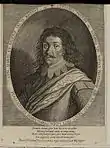
John Frederick, Duke of Saxe-Weimar
- January 1 – Friedrich Spanheim, Calvinistic theology professor at the University of Leiden (d. 1649)
- January 17 – Pedro Calderón de la Barca, Spanish playwright (d. 1681)[56]
- January 22 – Elisabet Juliana Banér, Swedish noble (d. 1640)
- January 23 – Alexander Keirincx, Flemish painter (d. 1652)
- January 28 – Pope Clement IX (d. 1669)[57]
- February – Edmund Calamy the Elder, English Presbyterian (d. 1666)
- February 1 – Johan Evertsen, Dutch admiral (d. 1666)
- February 2 – Gabriel Naudé, French librarian and scholar (d. 1653)
- February 6 – Matthew Brend, English landowner (d. 1659)
- February 9 – Jean-Joseph Surin, French Jesuit writer (d. 1665)
- February 24 – Manuel António of Portugal, Dutch-Portuguese nobleman (d. 1666)
- February 26 – Matsudaira Norinaga, Japanese daimyō (d. 1654)
- March 3
- March 19 – Anders Bille, Danish general (d. 1657)
- March 26 – Matthew Marvin, Sr., Connecticut settler (d. 1678)
- April 11 – Jacques Buteux, French missionary (d. 1652)
- April 13 – Duke Johann Wilhelm of Saxe-Altenburg, colonel in the Saxon Army (d. 1632)
- April 22 – Alessandro dal Borro, Austrian field marshal (d. 1656)
- May 25 – Thomas Hamilton, 2nd Earl of Haddington, Scottish noble (d. 1640)
- May 31 – Empress Xiaoduanwen of the Qing Dynasty (d. 1649)
- June 26
- June 29 – Maria Maddalena de' Medici, Italian princess (d. 1633)
.jpg.webp)
Eleonore Marie of Anhalt-Bernburg
- July 1 – George Gobat, French theologian (d. 1679)
- July 15 – Jan Cossiers, Flemish painter (d. 1671)
- July 20 – Sir Edward Acton, 1st Baronet, Sheriff of Shropshire (d. 1659)
- July 22
- August 7 – Eleonore Marie of Anhalt-Bernburg, Duchess consort of Mecklenburg-Güstrow (d. 1657)
- August 16 – Maria Celeste, Italian nun, daughter of Galileo Galilei (d. 1634)
- August 24 – Antoine de Laloubère, French Jesuit mathematician (d. 1664)
- August 29 – John Stawell, English Member of Parliament and governor of Taunton (d. 1662)
- September 5 – Loreto Vittori, Italian singer and composer (d. 1670)
- September 19
- September 29 – Sir Thomas Aston, 1st Baronet, English politician (d. 1645)
- September 30 – Francis Bacon, English politician and Ipswich MP (d. 1663)
- October 1 – Dirk Graswinckel, Dutch jurist (d. 1666)
- October 2 – Petronio Veroni, Roman Catholic prelate, Bishop of Boiano (1652–1653) (d. 1653)
- October 4 – Giovanni Paolo Oliva, Italian Jesuit (d. 1681)
- November – John Ogilby, English writer and cartographer (d. 1676)
- November 15 – Aniello Falcone, Italian Baroque painter (d. 1665)
- November 19
- December 12 – Denis of the Nativity, French sailor and cartographer (d. 1638)
- December 14 – Anna Magdalene of Hanau, German countess (d. 1673)
- December 15 – Selius Marselis, Dutch/Norwegian tradesman (d. 1663)
- December 20 – Nicolas Sanson, French cartographer (d. 1667)
- December – Marie de Rohan, French courtier and political activist (d. 1679)
- Marin le Roy de Gomberville, French poet and novelist (d. 1674)
- Anna Alojza Ostrogska, Polish noblewoman (d. 1654)
- William Prynne, English Puritan politician (d. 1669)
- Brian Walton, English bishop and scholar (d. 1661)
- Martine Bertereau, French mineralogist
- Jonas Bronck, Swedish colonist in America (d. 1643)
- Dud Dudley, first Englishman to smelt iron ore with coke (d. 1684)
- Piaras Feiritéar, Irish language poet (d. 1653)
- Samuel Hartlib, British scholar (d. 1662)
- Claude Lorrain, French Baroque painter, draughtsman and engraver (d. 1682)
- Samuel Rutherford, Scottish theologian and controversialist (d. 1660)
1601
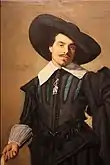
Cornelis Coning
- January 8 – Baltasar Gracián y Morales, Spanish prose writer (d. 1658)
- January 19 – Guido Cagnacci, Italian painter (d. 1663)
- February 4 – Shi Kefa, Chinese Ming Dynasty official (d. 1645)
- February 21 – Carolus Mulerius, Dutch Hispanist (d. 1638)
- February 22 – Pierre Chanut, French diplomat (d. 1662)
- March 7 – Johann Michael Moscherosch, German statesman, satirist (d. 1669)
- March 19 – Alonzo Cano, Spanish painter (d. 1667)
- March 20 – Henri, Count of Harcourt (d. 1666)
- March 22 – John Scudamore, 1st Viscount Scudamore, English politician and Viscount (d. 1671)
- March 31 – Jakov Mikalja, Italian linguist and lexicographer (d. 1654)
- May – Spencer Compton, 2nd Earl of Northampton (d. 1643)
- May 3 – Nathaniel Dickinson, American settler (d. 1676)
- May 27 – Antoine Daniel, Jesuit missionary at Sainte-Marie among the Hurons (d. 1648)
- June 5 – John Trapp, English theologian (d. 1669)
- June 6 – Hendrick Bloemaert, Dutch painter (d. 1672)
- June 21 – Godfrey Henschen, Jesuit hagiographer (d. 1681)
- June 23 – Anna Maria of Ostfriesland, German noblewoman (d. 1634)
- June 26 – Dorothea of Saxe-Altenburg, Duchess consort of Saxe-Eisenach (d. 1675)
- July 17 – Emmanuel Maignan, French physicist and theologian (d. 1676)
- July 18 – Philip I, Count of Schaumburg-Lippe (1640–1681) (d. 1681)
- July 20 – Robert Wallop, English politician (d. 1667)
- July 23 – János Szalárdi, Hungarian historian (d. 1666)
- July 30
- August 9 – Matthias Sention, Sr., Connecticut settler (d. 1669)
- August 11 – John Evelyn, English politician (d. 1685)
- August 15 – John Campanius, Swedish Lutheran minister in New Sweden (d. 1683)
- August 22 – Georges de Scudéry, French novelist, dramatist and poet (d. 1667)
- September 13
- September 22 – Anne of Austria, queen of Louis XIII of France and regent of France (d. 1666)[60]
- September 27 – King Louis XIII of France (d. 1643)[61]
- October 7 – Florimond de Beaune, French mathematician and jurist (d. 1652)
- October 9 – Fra Bonaventura Bisi, Italian painter (d. 1659)
- October 24 – Alvise Contarini, Doge of Venice (d. 1684)
- October 25 – John Frederick, Lord Mayor of London (d. 1685)
- October 26 – Jan Reynst, Dutch art collector (d. 1646)
- November 3 – Henri, Duke of Verneuil, French bishop (d. 1682)
- November 14 – John Eudes, French missionary (d. 1680)
- November 15 – Cecco Bravo, Italian painter (d. 1661)
- December 25 – Ernest I, Duke of Saxe-Gotha (1640–1675) and Saxe-Altenburg (1672–1675) (d. 1675)
- William Coddington, first governor of Rhode Island (d. 1678)
- Catherine Lepère, French midwife and abortion provider (k. 1679)
- Jacques Gaffarel, French librarian and astrologer (d. 1681)
- Cornelis Coning, Dutch engraver and mayor of Haarlem (d. 1671)
- William Brooke, 12th Baron Cobham, English politician (d. 1643)
- Adrian Scrope, English regicide (d. 1660)
- Rose of Turaida, famous Latvian murder victim (d. 1620)
- François Tristan l'Hermite, French dramatist (d. 1655)
- Edward Somerset, 2nd Marquess of Worcester (d. 1667)
1602

Mary of Jesus of Ágreda born 2 April
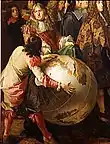
Gilles de Roberval born 10 August
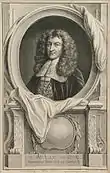
William Morice (Secretary of State) born 6 November
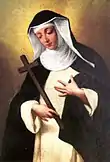
Agnes of Jesus born 17 November
- January 2
- January 14 – Sir Henry Slingsby, 1st Baronet, English baronet (d. 1658)
- January 18 – Robert Stuart, Duke of Kintyre and Lorne, fifth child of James VI of Scots and Anne of Denmark (d. 1602)
- January 19 – Anna Maria Antigó, Spanish Catholic nun (d. 1676)
- January 24 – Mildmay Fane, 2nd Earl of Westmorland, English politician (d. 1666)
- January 29 – Countess Amalie Elisabeth of Hanau-Münzenberg, Regent of Hesse-Kassel (1637–1650) (d. 1651)
- January 31 – Adam Billaut, French poet, carpenter (d. 1662)
- February 2 – Jeanne des Anges, French Ursuline nun in Loudun (d. 1665)
- February 12 – Michelangelo Cerquozzi, Italian painter (d. 1660)
- February 13 – William V, Landgrave of Hesse-Kassel (d. 1637)
- February 14 – Francesco Cavalli, Italian composer of the early Baroque period (d. 1676)
- February 16 – Eleonore Dorothea of Anhalt-Dessau, Duchess of Saxe-Weimar by marriage (d. 1664)
- February 18
- March 12 – Juan Velez, Spanish Catholic prelate who was appointed Bishop of Cebu (d. 1661)
- March 18 – Jacques de Billy, French Jesuit mathematician (d. 1679)
- March 24 – Edward Leigh, English writer (d. 1671)
- March 27 – Sir Christopher Yelverton, 1st Baronet, English politician (d. 1654)
- March 29
- April – William Lawes, English composer and musician (d. 1645)
- April 2 – Mary of Jesus of Ágreda, Franciscan abbess and spiritual writer (d. 1665)
- April 12 – Daniel Knudsen Bildt, Dano-Norwegian military officer and large estate owner in Norway (d. 1651)
- April 28 – Tokugawa Yorinobu, Japanese nobleman (d. 1671)
- April 30 – Robert Baillie, Scottish divine and historical writer (d. 1662)
- May 1 – William Lilly, English astrologer (d. 1681)
- May 2 – Athanasius Kircher, German scholar (d. 1680)
- May 10 – Samuel Newman, colonial Massachusetts clergyman (d. 1663)
- May 12 – Dorothea Augusta of Schleswig-Holstein-Gottorp, German duchess (d. 1682)
- May 26 – Philippe de Champaigne, French painter (d. 1674)
- June 2 – Rudolf Christian, Count of East Frisia, ruler of East Frisia in the early years of the Thirty Years' War (d. 1628)
- July 8 – François Perrochel, French cleric (d. 1682)
- July 9 – Maeda Gen'i, Japanese Buddhist priest
- July 14 – Cardinal Mazarin, French statesman (d. 1661)[62]
- July 15 – John Bradshaw, English judge and regicide (d. 1659)
- July 18 – Samuel Stone, Connecticut Puritan minister (d. 1663)
- July 26 – Ana de los Angeles Monteagudo, Peruvian nun (d. 1686)
- August 10 – Gilles de Roberval, French mathematician (d. 1675)
- August 23 – Sir John Marsham, 1st Baronet, English politician (d. 1685)
- August 31 – Amalia of Solms-Braunfels, Princess consort to Frederick Henry (d. 1675)
- September 1 – Peregrine Hoby, English politician (d. 1679)
- September 17 – Sir Richard Newdigate, 1st Baronet, English politician (d. 1678)
- September 29 – Algernon Percy, 10th Earl of Northumberland, English military leader (d. 1668)
- October 3 – Arnold Braemes, English politician (d. 1681)
- October 9 – Robert Caesar, English politician (d. 1637)
- October 12 – William Chillingworth, controversial English churchman (d. 1644)
- November 6 – William Morice, English politician (d. 1676)
- November 17 – Agnes of Jesus, French Catholic nun (d. 1634)
- November 20 – Otto von Guericke, German inventor and Mayor of Magdeburg (d. 1686)[63]
- November 22 – Elisabeth of France, queen of Philip IV of Spain (d. 1644)
- November 23 – Louis Philip, Count Palatine of Simmern-Kaiserslautern, Prince of Paltinate (d. 1655)
- November 27 – Chiara Margarita Cozzolani, Italian abbess and composer (d. 1670)
- December 4 – Johann Hülsemann, German theologian (d. 1661)
- December 7
- December 18 – Simonds d'Ewes, English antiquarian and politician (d. 1650)
- December 26 – Sir Norton Knatchbull, 1st Baronet, English politician (d. 1685)
- John Berkeley, 1st Baron Berkeley of Stratton (d. 1678)
- Caesar, duc de Choiseul, French marshal and diplomat (d. 1675)
- John Greaves, English mathematician and antiquary (d. 1652)
- Jean-Baptiste Budes, Comte de Guébriant, marshal of France (d. 1643)
- Edward Montagu, 2nd Earl of Manchester, English soldier (d. 1671)
- Henry Marten, English lawyer, politician and regicide (d. 1680)
- Theodorus Moretus, Flemish mathematician (d. 1667)
- Nectarius of Jerusalem, Orthodox Patriarch of Jerusalem (d. 1676)
- Dudley North, 4th Baron North, English politician (d. 1677)
- Katarzyna Ostrogska, Polish noblewoman (d. 1642)
- Antoine de l'Age, duc de Puylaurens, French courtier (d. 1635)
- Eleonora Ramirez di Montalvo, Italian educator (d. 1659)
- Owen Feltham, English religious writer (d. 1668)
- Richard Óge Martyn, Irish politician (d. 1648)
- Salomon van Ruysdael, Dutch landscape painter (d. 1670)
1603
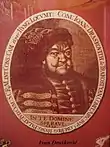
Ivan III Drašković
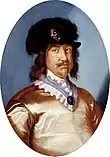
Christian, Prince-Elect of Denmark
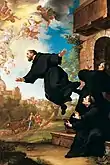
Joseph of Cupertino
- January 3 – Paul Stockmann, German hymnwriter (d. 1636)
- January 27
- January 30 – David Denicke, German jurist and hymnwriter (d. 1680)
- January – Shackerley Marmion, English dramatist (d. 1639)
- February 2 – Louise de Bourbon, French noble (d. 1637)
- February 7 – Friederich Stellwagen, German organ builder (d. 1660)
- February 12 – Friedrich Wilhelm II, Duke of Saxe-Altenburg (1639–1669) (d. 1669)
- March 2 – Pietro Novelli, Italian painter (d. 1647)
- March 13 – Ivan III Drašković, Croatian nobleman and soldier (d. 1648)
- March 18 – Simon Bradstreet, English colonial magistrate (d. 1697)
- March 21 bapt. – Samuel Luke, English politician (d. 1670)
- April 6 – Simon Paulli, Danish physician (d. 1680)
- April 10 – Christian, Prince-Elect of Denmark (d. 1647)
- April 19 – Michel le Tellier, French statesman (d. 1685)
- April 21 – Chamaraja Wodeyar VI, King of Mysore (d. 1637)
- April 24 – Thomas Allen, English politician (d. 1681)
- May 18 – Herbert Croft, English churchman (d. 1691)
- June 3 – Pietro Paolini, Italian painter (d. 1681)
- June 17 – Joseph of Cupertino, Italian saint (d. 1663)
- June 24 – Maria Overlander van Purmerland, Dutch noble (d. 1678)
- July 11
- July 12 – Edward Benlowes, English poet (d. 1676)
- July 23 – Axel Lillie, Swedish soldier and politician (d. 1662)
- July 27 – Alonso de Ovalle, Chilean priest and historian (d. 1651)
- August 9 – Johannes Cocceius, Dutch theologian (d. 1669)
- August 17 – Lennart Torstensson, Swedish Field Marshal, Privy Councillour and Governor-General (d. 1651)
- August 24 – Abu al-Ghazi Bahadur, Khan of Khiva, historian (d. 1663)
- September 10 – Henri Valois, French historian (d. 1676)
- September 14 – John Vaughan, Welsh judge (d. 1674)[65]
- September 15 – Tokugawa Yorifusa, Japanese nobleman (d. 1661)
- October 2 – Sir John Yonge, 1st Baronet, English politician (d. 1663)
- October 20 – Simon de Vos, Flemish painter (d. 1676)
- November 10 – Agneta de Graeff van Polsbroek, Dutch noble (d. 1656)
- November 16 – Augustyn Kordecki, Polish prior of the Jasna Góra Monastery (d. 1673)
- November 24 – John, Count of Nassau-Idstein (1629–1677) (d. 1677)
- December 21
- Jean de Launoy, French historian (d. 1678)
- Roger Williams, English theologian and colonist (d. 1684)
- Abel Janszoon Tasman, Dutch seafarer and explorer (d. 1659)
- Louis Abelly, French monk and priest (d. 1691)
- Margareta Brahe, Swedish noble (d. 1669)
- John Ashburnham, English Member of Parliament (d. 1671)
- Daniel Blagrave, English Member of Parliament (d. 1668)
- Valentin Conrart, one of the founders of the Académie française (d. 1675)[66]
- Denis Gaultier, French lutenist and composer (d. 1672)
- Aernout van der Neer, Dutch painter (d. 1677)
- Alexandre de Prouville, French statesman and soldier (d. 1670)
- William Stone, Colonial governor of Maryland (d. c. 1660)
1604
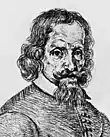
Johann Rudolf Glauber

Tokugawa Iemitsu
- January 4 – Jakob Balde, German Latinist (d. 1668)
- February 2 – Juan de Leyva de la Cerda, conde de Baños, Spanish noble (d. 1678)
- February 24 – Arcangela Tarabotti, born Elena Tarabotti, Venetian nun and feminist (d. 1652)
- March 10 – Johann Rudolf Glauber, German-Dutch alchemist and chemist (approximate date; d. 1670)[67]
- March 19 – King John IV of Portugal (d. 1656)
- March 23 – Girolamo Colonna, Catholic cardinal (d. 1666)
- April 5 – Charles IV, Duke of Lorraine (d. 1675)[68]
- April 9 – Duke Francis Henry of Saxe-Lauenburg (d. 1658)
- April 17
- April 22 – Peter Venables, Welsh politician (d. 1669)
- April 28 – Joris Jansen Rapelje, Early Dutch settler in colonial North America (d. 1662)
- May 1 – Louis, Count of Soissons (d. 1641)
- May 4 – Sir Hugh Owen, 1st Baronet, English politician (d. 1670)
- May 10 – Jean Mairet, classical French dramatist who wrote both tragedies and comedies (d. 1686)
- May 17 – Vincent Baron, French Dominican theologian writer (d. 1674)
- May 28 – Catherine of Brandenburg, Princess of Transylvania (1629–1630) (d. 1649)
- June 4 – Claudia de' Medici (d. 1648)
- June 10 – John Manners, 8th Earl of Rutland, English politician when he inherited the peerage (d. 1679)
- June 17 – John Maurice, Prince of Nassau-Siegen (d. 1679)
- June 28 – Heinrich Albert, German composer and poet (d. 1651)
- June 30 – Margaret Elisabeth of Leiningen-Westerburg, Regent of Hesse-Homburg (d. 1667)
- July 8 – Christiaen van Couwenbergh, Dutch painter (d. 1667)
- July 25 – Dorothea Diana of Salm, German noblewoman (d. 1672)
- August 4 – François Hédelin, abbé d'Aubignac, French author (d. 1676)
- August 12 – Tokugawa Iemitsu, Japanese shōgun (d. 1651)
- August 16 – Bernhard of Saxe-Weimar, general in the Thirty Years' War (d. 1639)
- August 25 – Shang Kexi, Chinese general (d. 1676)
- September 13 – Sir William Brereton, 1st Baronet, English soldier and politician (d. 1661)
- September 21 – Angelo Michele Colonna, Italian painter (d. 1687)
- October 14 – Nils Brahe, Swedish soldier and younger brother of Per Brahe (d. 1632)
- October 22 – Simon Le Moyne, French missionary (d. 1665)
- October 31
- November 3 – Osman II, Sultan of the Ottoman Empire (d. 1622)
- November 6 – George Ent, English scientist (d. 1689)
- November 7
- November 26 – Johannes Bach, German composer and musician (d. 1673)
- December 7 – Ambrose Corbie, English Jesuit teacher (d. 1649)
- December 10 – David Barry, 1st Earl of Barrymore, Irish noble (d. 1642)
- Jasper Mayne, English dramatist (d. 1672)
- Isaac Ambrose, English Puritan divine (d. 1664)
- Menasseh Ben Israel, Jewish Rabbi (d. 1657)
- Giovanni Battista Michelini, Italian painter (d. 1655)
- Edward Pococke, English Orientalist and biblical scholar (d. 1691)
- Abraham Bosse, French engraver and artist (d. 1676)
- Egbert Bartholomeusz Kortenaer, Dutch admiral (d. 1665)
1605

Shahryar

Federico Ubaldo della Rovere, Duke of Urbino

Simon Dach
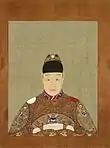
Tianqi Emperor
- January 16 – Shahryar, fifth and youngest son of the Mughal Emperor Jahangir (d. 1628)
- January 17 – Anthony Irby, English politician (d. 1682)
- February 1 – Isaac Aboab da Fonseca, Portuguese Sephardic rabbi (d. 1693)
- February 17 – Luca Ferrari, Italian painter (d. 1654)
- February 18
- February 20 – Sir John Lowther, 1st Baronet, of Lowther, English politician (d. 1675)
- March 1 – James Wriothesley, Lord Wriothesley, English politician (d. 1624)
- March 2 – René Menard, Canadian explorer (d. 1661)
- March 3 – George Horner, English politician (d. 1677)
- March 14 – Francis Davies, Welsh bishop (d. 1675)[69]
- March 17 – George II, Landgrave of Hesse-Darmstadt (1626–1661) (d. 1661)
- April 8
- King Philip IV of Spain (d. 1665)[70]
- Mary Stuart, English-Scottish princess (d. 1607)
- April 18 – Giacomo Carissimi, Italian composer (d. 1674)
- April 19 – Orazio Benevoli, Italian composer (d. 1672)
- April 30 – Peder Winstrup, Bishop of Lund (d. 1679)
- May 7 – Patriarch Nikon of Moscow, Patriarch of the Russian Orthodox Church (d. 1681)
- May 16 – Federico Ubaldo della Rovere, Duke of Urbino, Italian noble (d. 1623)
- May 29 – Hendrick van Anthonissen, Dutch painter (d. 1656)
- June 15 – Thomas Randolph, English poet and dramatist (d. 1635)
- June 22 – Andrea Bolgi, Italian sculptor (d. 1656)
- July 6 – Ulrich II, Count of East Frisia, ruler of East Frisia in the later years of the Thirty Years' War (d. 1648)
- July 25 – Theodore Haak, German scholar (d. 1690)
- July 29 – Simon Dach, Prussian German lyrical poet and writer of hymns (d. 1659)
- August 6
- August 8 – Cecil Calvert, 2nd Baron Baltimore, first Proprietor and Proprietary Governor of the Province of Maryland (d. 1675)
- August 18 – Henry Hammond, English churchman (d. 1660)
- August 25 – Philipp Moritz, Count of Hanau-Münzenberg, German noble (d. 1638)
- August 30 – Felice Ficherelli, Italian painter (d. 1660)
- August 31 – Nicolas Talon, French Jesuit (d. 1691)
- September 1 – Michele Mazzarino, Italian Catholic cardinal (d. 1648)
- September 8 – Cornelis Jan Witsen, Mayor of Amsterdam (d. 1669)
- September 12 – William Dugdale, English antiquary and herald (d. 1686)
- September 14 – Brynjólfur Sveinsson, Icelandic bishop and scholar (d. 1675)
- September 17 – Francesco Sacrati, Italian composer (d. 1650)
- September 24 – Antoine Godeau, French bishop and poet (d. 1672)
- September 28 – Ismaël Bullialdus, French astronomer (d. 1694)
- October 15 – Marie de Bourbon, Duchess of Montpensier, French princess (d. 1627)
- October 16 – Charles Coypeau d'Assoucy, French writer and composer (d. 1677)
- October 19 – Sir Thomas Browne, English physician and philosopher (d. 1682)
- October 22 – Frédéric Maurice de La Tour d'Auvergne, prince of the independent principality of Sedan (d. 1652)
- November 3 – John Henderson, 5th of Fordell, Scottish noble (d. 1650)
- November 4 – William Habington, English poet (d. 1654)
- November 5 – Thomas Shepard, American Puritan minister and a significant figure in early colonial New England (d. 1649)
- December 1 – Roger Hill, English politician (d. 1667)
- December 8 – François Vavasseur, French writer (d. 1681)
- December 16 – Jerome Weston, 2nd Earl of Portland, English diplomat and landowner (d. 1663)
- December 23 – Tianqi Emperor, Ming emperor of China (d. 1627)
- December 25 – Francis Godolphin, English politician (d. 1667)
- William Berkeley, English governor of Virginia (d. 1677)
- Adriaen Brouwer, Flemish painter (d. 1638)
- Aleksander Dominik Kazanowski, Polish nobleman (d. 1648)
- Alexandra Mavrokordatou, Greek intellectual and salonist (d. 1684)
- Afanasy Ordin-Nashchokin, Russian statesman (d. 1680)
- Jean-Baptiste Tavernier, French traveller and pioneer of trade with India (d. 1689)
- Constantia Zierenberg, German-Polish singer (d. 1653)
- Thomas Hastings, American politician (d. 1685)
- Johann Rudolf Stadler, Swiss clock-maker (d. 16 October 1637)[71]
- Ayşe Sultan and/or Gevherhan Sultan, Ottoman princesses, daughters of Ahmed I
- Semyon Dezhnev, Pomor navigator (d. 1672)
- John Gauden, English bishop and writer (d. 1662)
- William Goffe, English parliamentarian and regicide (d. 1679)
- Thomas Nabbes, English dramatist (d. c. 1645)
- Francis Willoughby, 5th Baron Willoughby of Parham, English noble (d. 1666)
1606
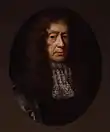
Edmund Waller
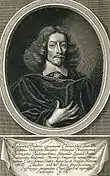
John Bulwer

Wouter van Twiller
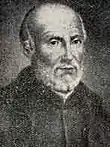
Julian Maunoir
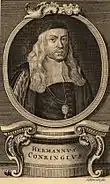
Hermann Conring
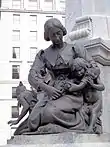
Jeanne Mance
- January 1 (bapt.) – Eva Ment, Dutch culture personality (d. 1652)
- January 4 (bapt.) – Edmund Castell, English orientalist (d. 1685)
- January 9 – William Dugard, English printer (d. 1662)
- January 11 – Judit Rumy, Hungarian noble (d. 1663)
- January 30 – Sir Orlando Bridgeman, 1st Baronet, of Great Lever (d. 1674)
- February 10 – Christine of France, Duchess of Savoy (d. 1663)
- February 12 – John Winthrop, the Younger, Governor of Connecticut (d. 1676)
- February 16 – William White, English politician (d. 1661)
- February 23
- February 27 – Laurent de La Hyre, French Baroque painter (d. 1656)
- c. February 28 – William Davenant, English poet and playwright (d. 1668)
- March – Henry Pierrepont, 1st Marquess of Dorchester (d. 1680)
- March 3 – Edmund Waller, English poet (d. 1687)
- March 18 – John X of Schleswig-Holstein-Gottorp, Prince-Bishop of Lübeck (1634–1655) (d. 1655)
- March 20 – Georg von Derfflinger, field marshal in the army of Brandenburg-Prussia (1618–1648) (d. 1695)
- March 25 – Gertrude More, English nun (d. 1633)
- March 27 – Hans Svane, Danish statesman (d. 1668)
- March 28 – Jacob Masen, German poet (d. 1681)
- March 30 – Vincentio Reinieri, Italian mathematician and astronomer (d. 1647)
- April 1 – Ernest Christopher, Count of Rietberg (1625–1640) (d. 1640)
- April 5 – Nicolas Perrot d'Ablancourt, Translator (d. 1664)
- April 6 – Amable de Bourzeys, French writer and academic (d. 1672)
- April 14 – Juliana of Hesse-Darmstadt, Countess of East Frisia (d. 1659)
- May 3
- May 6 – John Norton, American divine (d. 1663)
- May 12 – Joachim von Sandrart, German Baroque art-historian and painter (d. 1688)
- May 14 – Agnes of Hesse-Kassel, Princess consort of Anhalt-Dessau (d. 1650)
- May 16 (bapt.) – John Bulwer, British doctor (d. 1656)
- May 17 – Marco Faustini, Italian opera manager (d. 1676)
- May 22 – Wouter van Twiller, Director-General of New Netherland from 1633 until 1638 (d. 1654)
- May 23 – Juan Caramuel y Lobkowitz, Spanish writer (d. 1682)
- May 25 – Saint Charles Garnier, Jesuit missionary (d. 1649)[72]
- June 3 – George Aribert of Anhalt-Dessau, German nobleman (d. 1643)
- June 6 – Pierre Corneille, French dramatist (d. 1684)
- June 16 – Arthur Chichester, 1st Earl of Donegall, Irish peer and soldier (d. 1675)
- June 19 – James Hamilton, 1st Duke of Hamilton, Scottish politician and noble (d. 1649)
- July 8 – Jean Gamans, German hagiographer (d. 1684)
- July 10 – Corfitz Ulfeldt, Danish statesman (d. 1664)
- July 13 – Roland Fréart de Chambray, French architectural theorist (d. 1676)
- July 15 – Rembrandt (van Rijn), Dutch painter (d. 1669)[73]
- July 20 – Hans Conrad Werdmüller, Swiss military commander (d. 1674)
- August 13 – Esteban de Aguilar y Zúñiga, Spanish writer (d. 1681)
- August 15 – Giovanna Maria Bonomo, beatified Italian Catholic nun (d. 1670)
- August 18 – Maria Anna of Spain (d. 1646)
- August 22 – Camille de Neufville de Villeroy, Archbishop of Lyon (d. 1693)
- September 1 – Nicholas Slanning, English politician (d. 1643)
- September 12 – John Spelman, English politician (d. 1663)
- September 18
- September 22
- September 28 – Sir William Drake, 1st Baronet, English politician (d. 1669)
- October 1 – Julian Maunoir, French Jesuit priest (d. 1683)
- October 12
- October 14 – Joan Maetsuycker, Governor-General of the Dutch East Indies from 1653 to 1678 (d. 1678)
- October 16 – Ottavio Amigoni, Italian painter (d. 1661)
- October 19 – Sir Gerrard Napier, 1st Baronet, English politician (d. 1673)
- October 20 – Francesco Maria Mancini, Italian Catholic cardinal (d. 1672)
- October 30 – Jean-Jacques Bouchard, French erotic writer (d. 1641)
- November 9 – Hermann Conring, German philosopher (d. 1681)
- November 12 – Jeanne Mance, French nurse and settler of New France (d. 1673)
- December 1 – Johann von Hoverbeck, Prussian diplomat (d. 1682)
- December 8 – Nicolò Sagredo, 105th Doge of Venice (d. 1676)
- December 11 – Thomas Nott, English Army officer (d. 1681)
- Leonard Calvert, Colonial governor of Maryland (d. 1647)
- Giovanni Francesco Grimaldi, Italian architect and painter (d. 1680)
- Thomas Herbert, English traveller and historian (d. 1682)
- John Robartes, 1st Earl of Radnor, English politician (d. 1685)
- Pierre du Ryer, French dramatist (d. 1658)
- Tokugawa Tadanaga, Japanese nobleman (d. 1633)
- Thomas Washbourne, English clergyman and poet (d. 1687)
1607

Antonio Barberini

Jan Lievens

Anna Maria van Schurman
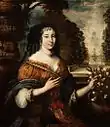
Madeleine de Scudéry

John Harvard
- January 10 – Isaac Jogues, French Jesuit missionary to the Native Americans (d. 1646)
- January 30 – Willem Nieupoort, Dutch politician, and diplomat (d. 1678)
- January 31 – James Stanley, 7th Earl of Derby (d. 1651)
- February 9 – Abraham Megerle, Austrian composer and organist (d. 1680)
- February 22 – Edward Thurland, English politician (d. 1683)
- February 25 – Ahasuerus Fromanteel, English clockmaker (d. 1693)
- February 27 – Christian Keymann, German hymnwriter (d. 1662)
- March – Archibald Campbell, 1st Marquess of Argyll, Scottish clan chief (d. 1661)
- March 8 – Johann Rist, German poet and dramatist known for hymns (d. 1667)
- March 9 – Gervase Holles, English Member of Parliament (d. 1675)
- March 10 – Thomas Wriothesley, 4th Earl of Southampton, English statesman (d. 1667)[74]
- March 12 – Paul Gerhardt, German theologian (d. 1676)
- March 24 – Michiel de Ruyter, Dutch admiral (d. 1676)[75]
- March 31 – Philippe Le Sueur de Petiville, French poet (d. 1657)
- April 5 – (bapt.) John Boys, English Royalist soldier, Lord Warden of the Cinque Ports (d. 1664)
- April 16 – Nicolas Henri, Duke of Orléans, French duke (d. 1611)
- April 26 – Countess Palatine Magdalene Catherine of Zweibrücken and Duchess of Birkenfeld (d. 1648)
- May 21 – Sir Philip Musgrave, 2nd Baronet, English politician (d. 1678)
- May 31 – Johann Wilhelm Baur, German artist (d. 1640)
- June 17 – Lacuzon, Franche-Comté military leader (d. 1681)
- June 24 – Jean-Jacques Renouard de Villayer, French postal pioneer (d. 1691)
- July 1 – Thomas de Critz, British artist (d. 1653)
- July 12 – Jean Petitot, French-Swiss enamel painter (d. 1691)
- July 13 – Václav Hollar, Bohemian etcher (d. 1677)
- August – Claude de Rouvroy, duc de Saint-Simon, French courtier (d. 1693)
- August 5
- August 6 – Dirck van der Lisse, Dutch painter (d. 1669)
- August 15
- August 24 – Sebastian von Rostock, German bishop (d. 1671)
- September 15 – Archduke Charles of Austria (d. 1632)
- September 25 – Dorothea of Anhalt-Zerbst, Duchess of Brunswick-Wolfenbüttel (d. 1634)
- September 26 – Francesco Cairo, Italian painter (d. 1665)
- October 4 – Francisco de Rojas Zorrilla, Spanish dramatist (d. 1648)
- October 19 – Louis of Anhalt-Köthen, German prince (d. 1624)
- October 24 – Jan Lievens, Dutch painter (d. 1674)
- October 25 – Antonio de la Cerda, 7th Duke of Medinaceli, Grandee of Spain (d. 1671)
- November 1 – Georg Philipp Harsdörffer, Baroque-period German poet and translator (d. 1658)
- November 5 – Anna Maria van Schurman, Dutch painter (d. 1678)
- November 6 – Sigmund Theophil Staden, important early German composer (d. 1655)
- November 10 – John Gregory, English orientalist (d. 1646)
- November 15
- November 23 – Andrzej Trzebicki, nobleman and priest in the Polish-Lithuanian Commonwealth (d. 1679)
- November 25 – Kanō Naonobu, Japanese painter of the Kanō school of painting during the early Edo period (d. 1650)
- November 26 – John Harvard, English-born American clergyman (d. 1638)
- November 28 – Francesco Sforza Pallavicino (d. 1667)
- December 4 – John Frescheville, 1st Baron Frescheville, English politician (d. 1682)
- December 6 – Christopher Turnor, English judge (d. 1675)
- December 10 – Kjeld Stub, Danish priest (d. 1663)
- December 14 – John Kemény, Prince of Transylvania (d. 1662)
- December 17 – Pacecco De Rosa, Italian painter (d. 1656)
- December 19 – Remigius van Leemput, painter from the Southern Netherlands (d. 1675)
- December 30
- Jan Kazimierz Krasiński, Polish nobleman (d. 1669)
- John Dixwell, English judge and regicide (d. 1689)[77]
- Pierre de Fermat, French mathematician (d. 1665)
- Yagyū Jūbei Mitsuyoshi, Japanese samurai (d. 1650)
1608
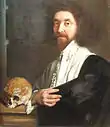
John Tradescant the Younger born 4 August
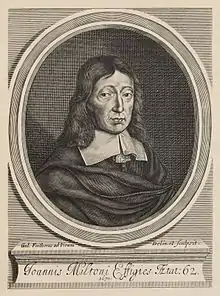
John Milton born 9 December
- January 10 – Henry Winthrop, governor of the Massachusetts Bay Company (d. 1630)
- January 14 – Francis Hawley, 1st Baron Hawley, English politician (d. 1684)
- January 21 – Theaurau John Tany, English Christian mystic (d. 1659)
- January 26 – Johannes Heinrich Ursinus, German Lutheran scholar (d. 1667)
- January 28 – Giovanni Alfonso Borelli, Italian physiologist and physicist (d. 1679)
- January 30 – John Oxenbridge, English Nonconformist divine (d. 1674)
- February 5 – Gaspar Schott, German Jesuit scholar (d. 1666)
- February 6 – António Vieira, Portuguese writer (d. 1697)
- February 12 – Daniello Bartoli, Italian Jesuit priest (d. 1685)
- February 20 – Arthur Capell, 1st Baron Capell of Hadham (d. 1649)
- February 21 – Elizabeth Barnard, Granddaughter of William Shakespeare (d. 1670)
- March 18 – Paul Ragueneau, French Jesuit missionary (d. 1680)
- March 27 – Thomas Rouse, English politician (d. 1676)
- March 28 – Léon Bouthillier, comte de Chavigny, French politician (d. 1652)
- April 13 – Cornelis Schrevel, Dutch scholar (d. 1664)
- April 14 – Illiam Dhone, Manx politician (d. 1663)
- April 15
- Honoré Fabri, French mathematician (d. 1688)
- John Huddleston, English monk of the Order of St. Benedict (d. 1698)
- April 20 – Edward Rainbowe, English clergyman and preacher (d. 1684)
- April 23 – Thomas Minor, American city founder (d. 1690)
- April 24 – Gaston, Duke of Orléans, third son of King Henry IV of France (d. 1660)[78]
- May 1 – Pieter Post, Dutch architect, painter and printmaker (d. 1669)
- May 15 – René Goupil, French Jesuit lay missionary (d. 1642)
- June – Richard Fanshawe, English diplomat (d. 1666)
- June 19 (bapt.) – Thomas Fuller, English churchman and historian (d. 1661)
- July 13 – Ferdinand III, Holy Roman Emperor (d. 1657)
- July 14 – George Goring, Lord Goring, English Royalist soldier (d. 1657)
- July 24 – Sir Philip Wodehouse, 3rd Baronet, English baronet (d. 1681)
- August 4 – John Tradescant the Younger, British botanist (d. 1662)
- August 15 – Henry Howard, 22nd Earl of Arundel, English politician (d. 1652)
- August 16 – Jean-Louis Raduit de Souches, German Imperial field marshal (d. 1682)
- August 20 – Ludovicus a S. Carolo, French monk (d. 1670)
- August 30 – Alonso Perez de Leon, Spanish conquistador, explorer, man of letters (d. 1661)
- September 1 – Giacomo Torelli, Italian stage designer, engineer, and architect (d. 1678)
- September 15 – Niccolò Albergati-Ludovisi, Italian Catholic cardinal (d. 1687)
- September 17 – Cesare Facchinetti, Italian Catholic cardinal (d. 1683)
- September 19 – Alfonso Litta, Cardinal, Archbishop of Milan (d. 1679)
- September 20
- October 3 – Nicole, Duchess of Lorraine, French noble (d. 1657)
- October 15 – Evangelista Torricelli, Italian physicist and mathematician (d. 1647)[79]
- October 18 – John Conant, English theologian, clergyman, and academic administrator (d. 1694)
- November 5 – Margareta Huitfeldt, Norwegian-Swedish noble (d. 1683)
- November 9 – Tiberio Fiorilli, Italian actor (d. 1694)
- November 10 – Eleanor of Anhalt-Zerbst, duchess by marriage of Schleswig-Holstein-Sønderburg-Norburg (d. 1681)
- November 13 (bapt.) – John Desborough, English soldier and politician (d. 1680)
- November 16 – Johann Freinsheim, German classical scholar, critic (d. 1660)
- November 23 – Francisco Manuel de Mello, Portuguese writer (d. 1666)
- December 6 – George Monck, 1st Duke of Albemarle, English soldier (d. 1670)[80]
- December 8 – Vendela Skytte, Swedish noble (d. 1629)
- December 9 – John Milton, English poet (d. 1674)[81]
- December 15
- Thomas Barlow, Bishop of Lincoln, English churchman (d. 1691)
- Eudoxia Streshneva, Tsarina of Mikhail I of Russia (d. 1645)
- Ayşe Sultan and/or Hanzade Sultan, Ottoman princesses, daughters of Ahmed I
1609
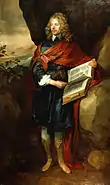
John Suckling
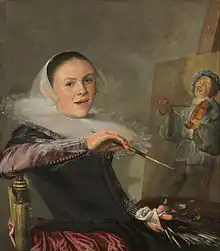
Judith Leyster
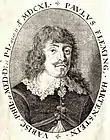
Paul Fleming
_-_MV_1002.jpg.webp)
Josias von Rantzau
- January 18
- January 20 – Carlo Ceresa, Italian painter (d. 1679)
- January 30 – Václav Eusebius František, Prince of Lobkowicz, Austrian field marshal and prince (d. 1677)
- February 10
- February 14 – Bartram de Fouchier, Dutch painter (d. 1673)
- February 18 – Edward Hyde, 1st Earl of Clarendon, English statesman and historian (d. 1674)[83]
- February 21 – Raimondo Montecuccoli, Italian general (d. 1680)
- March 16
- March 18 – King Frederick III of Denmark (d. 1670)[84]
- March 22 – John II Casimir of Poland (d. 1672)
- March 23 – Johann Heinrich Schönfeld, German artist (d. 1684)
- March 25 – Paul Fréart de Chantelou, French collector and patron of the arts (d. 1694)
- April 6 – Walter Aston, 2nd Lord Aston of Forfar, second and eldest surviving son of Walter Aston (d. 1678)
- April 15 – Richard Winwood, English politician (d. 1688)
- May 6 – Antonie Waterloo, Flemish painter (d. 1690)
- May 10 – Mauritia Eleonora of Portugal, Princess of Portugal and through marriage countess of Nassau-Siegen (d. 1674)
- June 2 – Zsófia Bosnyák, Hungarian noblewoman (d. 1644)
- June 17 – John of Hesse-Braubach, German general (d. 1651)
- June 29 – Pierre-Paul Riquet, French engineer and canal builder (d. 1680)
- July 17 – Wilhelm Gumppenberg, German Jesuit theologian (d. 1675)
- July 28 – Judith Leyster, Dutch painter (d. 1660)[85]
- July 29 – Maria Gonzaga, Duchess of Montferrat, Italian noble (d. 1660)
- August 6 – Richard Bennett, British Colonial Governor of Virginia (d. 1675)
- August 21 – Jean Rotrou, French poet and tragedian (d. 1650)
- August 25 – Giovanni Battista Salvi da Sassoferrato (d. 1685)
- August 30
- September 3 – Raymond Breton, French missionary (d. 1679)
- September 19 (or 1605) – Thomas Gouge, English minister (d. 1681)
- October 5 – Paul Fleming, German physician and poet (d. 1640)
- October 8 – John Clarke, English physician (d. 1676)
- October 9 – Thomas Weston, 4th Earl of Portland, younger son of the Richard Weston (d. 1688)
- October 14 – Ernest Günther, Duke of Schleswig-Holstein-Sonderburg-Augustenburg, Duke of Schleswig-Holstein of its Sonderborg line (d. 1689)
- October 16 – Thomas Minors, English politician and merchant (d. 1677)
- October 18 – Josias von Rantzau, Marshal of France (d. 1650)
- October 19 – Gerrard Winstanley, English Protestant religious reformer (d. 1676)
- October 26 – William Sprague, English co-founder of Charlestown, Massachusetts (d. 1675)
- October 29 – Wadham Wyndham, English judge (d. 1668)
- November 1 – Matthew Hale, Lord Chief Justice of England (d. 1676)
- November 23 – Sophia Eleonore of Saxony, German duchess (d. 1671)
- November 25 – Henrietta Maria of France, queen of England, Scotland and Ireland (d. 1669)[86]
- November 26 – Henry Dunster, first President of Harvard College (d. 1659)
- December 6 – Nicholas Francis, Duke of Lorraine (d. 1670)
- December 11 – Alexander Cooper, English Baroque miniature painter (d. 1660)
- December 13 – Isbrand van Diemerbroeck, Dutch physician (d. 1674)
- December 24 – Philip Warwick, English writer and politician (d. 1683)
- December 30 – Anna Maria von Eggenberg, née Brandenburg-Bayreuth, Austrian noble (d. 1680)
- Luc d'Achery, French Benedictine (d. 1685)
- Samuel Cooper, English miniature painter (d. 1672)
- Alberich Mazak, Austrian composer (d. 1661)
- Elizabeth Isham, English diarist (d. 1654)
- Hannibal Sehested, Danish statesman (d. 1666)
- Thomas Greene, Colonial governor of Maryland (d. 1651)
Gauthier de Costes, seigneur de la Calprenède, French novelist and dramatist (d. 1663)
Deaths
1600
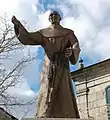
Sebastian de Aparicio
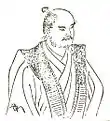
Shima Sakon
.jpg.webp)
Richard Hooker
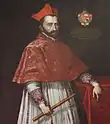
Margrave Andrew of Burgau
- January 9 – John Spencer, English landowner and politician (b. 1549)
- January 21 – Jerzy Radziwiłł, Polish–Lithuanian nobleman (szlachcic) from the Radziwiłł family (b. 1556)
- February 9 – John Frederick, Duke of Pomerania, Protestant Bishop of Cammin (1567–1574) and ruling Duke of Pomerania (1569–1600) (b. 1542)
- February 15 – José de Acosta, Spanish Jesuit missionary and naturalist (b. 1540)
- February 17 – Giordano Bruno, Italian philosopher (burned at the stake) (b. 1548)[87]
- February 25 – Sebastian de Aparicio, Spanish colonial industrialist, Roman Catholic priest and blessed in Mexico (b. 1502)
- February 29 – Caspar Hennenberger, German historian and cartographe (b. 1529)
- March 6 – Johann Major, German poet and theologian (b. 1533)
- March 20 – Gustaf Banér, Swedish noble (b. 1547)
- April 1 – Esperanza Malchi, Ottoman businessperson
- April – Thomas Deloney, English writer (b. 1543)
- May 17 – Thomas Leighton, English politician (b. 1554)
- May 18
- May 19 – Abe Masakatsu, Japanese nobleman (b. 1541)
- June 3 – Juan Grande Román, Spanish Catholic saint (b. 1546)
- June 8 – Edward Fortunatus, German nobleman (b. 1565)
- June 25 – David Chytraeus, German historian and theologian (b. 1530)[88]
- June 19 – Christopher Layer, English politician (b. 1531)
- July 5 – Jean Kincaid, Scottish murderer (b. 1579)
- July 7 – Thomas Lucy, English politician (b. 1532)
- July 20 – William More, English courtier (b. 1520)
- July 27 – John Glanville, English politician (b. 1542)
- August 5
- August 18 – Sebastiano Montelupi, Italian businessman (b. 1516)
- August 22 – Nicasius de Sille, Dutch diplomat (b. 1543)
- August 25 – Hosokawa Gracia, Japanese noblewoman (b. 1563)
- August 27 – Mizuno Tadashige, Japanese nobleman (b. 1541)
- September 1 – Tadeáš Hájek, Czech physician and astronomer (b. 1525)
- September 25 – Antoine du Verdier, French politician (b. 1544)[90]
- September 26 – Claude Le Jeune, French composer (b. 1530)[91]
- October 12 – Luis de Molina, Spanish Jesuit priest and philosopher (b. 1535)[92]
- October 16 – Nicolaus Reimers, German astronomer (b. 1551)
- October 17 – Cornelis de Jode, Flemish cartographer, engraver and publisher (b. 1568)
- October 21
- November 3 – Richard Hooker, English Anglican theologian (b. 1554)
- November 6
- November 8 – Natsuka Masaie, Japanese warlord (b. 1562)
- November 12 – Margrave Andrew of Burgau, German nobleman, Cardinal, Bishop of Constance and Brixen (b. 1558)
- November 15 – Sigmund Fugger von Kirchberg und Weißenhorn, bishop of Regensburg (b. 1542)
- November 17 – Kuki Yoshitaka, Japanese naval commander (b. 1542)
- November 25 – Juan Téllez-Girón, 2nd Duke of Osuna, Spanish duke (b. 1559)
- November 30 – Nanda Bayin, King of Burma (b. 1535)
- December 3 – Roger North, 2nd Baron North, English politician (b. 1530)
- December 16 – Charles I, Count Palatine of Zweibrücken-Birkenfeld (1569–1600) (b. 1560)
- December 5- Francesco II dead (1560)
1601
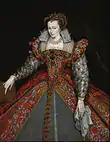
Louise of Lorraine
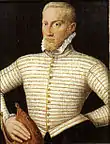
Gebhard Truchsess von Waldburg
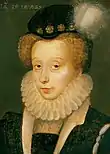
Henriette of Cleves
- January 11 – Scipione Ammirato, Italian historian (b. 1531)
- January 17 – Christoffer Valkendorff, Danish politician (b. 1525)
- January 19 – Henry Herbert, 2nd Earl of Pembroke, English statesman (b. 1538)
- January 29 – Louise of Lorraine, French queen consort (b. 1553)
- February 7 – Martin Garzez, Aragonese-born 53rd Grandmaster of the Knights Hospitaller (b. 1526)
- February 25 – Robert Devereux, 2nd Earl of Essex, English politician (b. 1566)[93]
- February 27 – Anne Line, English Catholic martyr (b. c. 1563)
- March 2 – Antonio del Rincón, Mexican academic (b. 1566)
- March 13 – Henry Cuffe, English politician (b. 1563)
- April 5 – Wolfgang von Dalberg, Roman Catholic Archbishop of Mainz, Germany (b. 1538)
- April 10 – Mark Alexander Boyd, Scottish poet and soldier of fortune (b. 1562)
- May 10 – Hans van Steenwinckel the Elder, Flemish/Danish architect, sculptor (b. 1550)
- May 12 – Anna III, Abbess of Quedlinburg, Princess-Abbess of Quedlinburg (b. 1565)
- May 19 – Costanzo Porta, Italian composer (b. 1528)
- May 21 – Gebhard Truchsess von Waldburg, Archbishop-Elector of Cologne (b. 1547)
- June 11 – Françoise d'Orléans-Longueville, French princess (b. 1549)
- June 16 – Lewis Mordaunt, 3rd Baron Mordaunt, Member of Parliament and High Sheriff of Bedfordshire and Buckinghamshire (b. 1538)
- June 17 – Gabriel Goodman, English priest (b. 1528)[94]
- June 24 – Henriette of Cleves, Duchess of Nevers, Countess of Rethel (b. 1542)
- June 25 – Peregrine Bertie, 13th Baron Willoughby de Eresby, English baron (b. 1555)
- June 27 – Henry Norris, 1st Baron Norreys (b. 1525)
- August 9 – Prince Michael the Brave of Wallachia (b. 1558)
- August 11 – Johannes Heurnius, Dutch physician (b. 1543)
- August 19 – William Lambarde, English antiquarian and politician (b. 1536)
- September 7 – John Shakespeare, English glover, father of William Shakespeare (b. 1529)
- September 12 – Meletius I Pegas, Greek Patriarch of Alexandria (b. 1549)
- September 20 – Fernando Ruiz de Castro Andrade y Portugal, Grandee of Spain (b. 1548)
- October 12 – Nicholas Brend, English landowner (b. 1560)
- October 21 – Hoshina Masanao, Japanese daimyō of the Takeda clan (b. 1542)
- October 24
- Tycho Brahe, Danish astronomer (b. 1546)[95]
- Louis Philip, Count Palatine of Guttenberg, Palatinate-Veldenz (b. 1577)
- November 16 – Charles Neville, 6th Earl of Westmorland, exiled English nobleman (b. 1542)
- December 3 – Peter Thyraeus, German theologian (b. 1546)
- December 17 – Bernardino de Cárdenas y Portugal, Duque de Maqueda, Spanish noble (b. 1553)
- Girolamo Dalla Casa, Italian composer
- Ogawa Suketada, Japanese daimyō (b. 1549)
- Onodera Shigemichi, Japanese samurai
1602
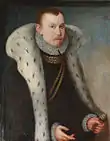
Ludvig Munk died 8 April
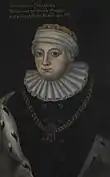
Anna of Mecklenburg died 4 July
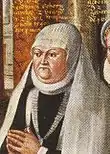
Hedwig of Brandenburg died 21 October
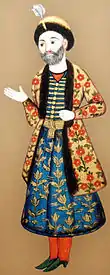
David I of Kakheti died 21 October
- January – Claude Fauchet, French historian
- February 3 – Paulus Melissus, German composer (b. 1539)
- February 13 – Alexander Nowell, English clergyman (b. 1507)
- February 19 – Philippe Emmanuel, Duke of Mercœur, French soldier (b. 1558)
- March 11 – Emilio de' Cavalieri, Italian composer (b. c. 1550)
- March 12 – Philip IV, Count of Nassau-Weilburg and Nassau-Saarbrücken (1574–1602) (b. 1542)
- March 22 – Agostino Carracci, Italian painter and graphical artist (b. 1557)
- March 24 – Ii Naomasa, Japanese general (b. 1561)
- March 25 – Joachim Frederick of Brieg, Duke of Wołów (b. 1550)
- April 8 – Ludvig Munk, Governor-general of Norway (b. 1537)
- April 10 – Amalia of Neuenahr, German noble (b. 1539)
- April 20 – Thomas Tichborne, English martyr (b. 1567)
- April 26 – Antonio Maria Salviati, Italian Catholic cardinal (b. 1537)
- May 9 – Giulio Antonio Santorio, Italian Catholic cardinal (b. 1532)
- May 22 – Renata of Lorraine (b. 1544)
- May 27 – Robert Stuart, Duke of Kintyre and Lorne, infant son of King James I/VI
- July 4 – Anna of Mecklenburg, Duchess consort of Courland (1566–1587) (b. 1533)
- July 7 – Friedrich Wilhelm I, Duke of Saxe-Weimar, German noble (b. 1562)
- August 12 – Abu'l-Fazl ibn Mubarak, Mughal vizier and historian (b. 1551)
- August 23 – Bastianino, Italian painter (b. c. 1536)
- September 14 – Jean Passerat, French writer (b. 1534)
- September 25
- September 30 – Catherine of Brandenburg-Küstrin, daughter of Margrave John of Küstrin (b. 1549)
- October – Thomas Morley, English composer (b. 1557)[96]
- October 1 – Hernando de Cabezón, Spanish composer and organist (b. 1541)
- October 7 – Thomas Schweicker, German artist (b. 1540)
- October 13 – Franciscus Junius, French theologian (b. 1545)
- October 20 – Walter Leveson, English Elizabethan Member of Parliament, Shropshire landowner (b. 1550)
- October 21
- October 28 – John, Prince of Schleswig-Holstein, youngest son of Frederick II of Denmark and Norway (b. 1583)
- October 30 – Jean-Jacques Boissard, French antiquary and Latin poet (b. 1528)[97]
- October 31 – Dominic Collins, Irish Jesuit lay brother and martyr (b. 1566)
- November 23 – Agnes of Solms-Laubach, Landgravine of Hesse-Kassel (b. 1578)
- November 29 – Anthony Holborne, English composer (b. c. 1545)
- December 1 – Kobayakawa Hideaki, Japanese samurai and warlord (b. 1577)
- December 29 – Jacopo Corsi, Italian composer (b. 1561)
- Kim Myeong-won, Korean politician
- Epifani Olives i Terès, Spanish politician
- Oda Ujiharu, Japanese warlord
- Valpuri Innamaa, Finnish shipowner
1603
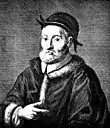
Andrea Cesalpino
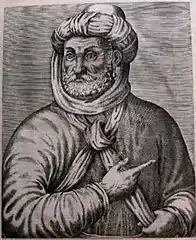
Ahmad al-Mansur
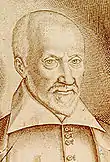
Pierre Charron
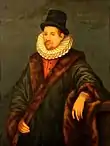
William Gilbert
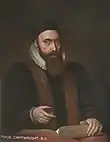
Thomas Cartwright
- January 25 – Francesco Zirano, Italian priest who was a member of the Order of Friars Minor (b. 1564)
- February 7
- February 23
- Andrea Cesalpino, Italian philosopher, physician, and botanist (b. 1519)
- Franciscus Vieta, French mathematician (b. 1540)
- February 26 – Maria of Austria, Holy Roman Empress, spouse of Maximilian II (b. 1528)
- March 14 – Ulrich, Duke of Mecklenburg-Güstrow (1555–1603) (b. 1527)
- March 22 – Robert Seton, 1st Earl of Winton, Scottish peer who supported Mary, Queen of Scots (b. 1553)
- March 24 – Queen Elizabeth I of England (b. 1533)[98]
- March 25 – Ikoma Chikamasa, Japanese warlord (b. 1526)
- April 4 – Aegidius Hunnius, German theologian (b. 1550)
- April 25 – George Frederick, Margrave of Brandenburg-Ansbach (b. 1539)
- May 4
- May 14 – Magnus II, Duke of Saxe-Lauenburg, German duke (b. 1543)
- June – Baldassare Donato, Italian composer and singer (b. 1525)
- June 2
- June 27 – Jan Dymitr Solikowski, Polish archbishop, writer, and diplomat (b. 1539)
- July 4 – Philippe de Monte, Flemish composer (b. 1521)
- July 10 – Joan Terès i Borrull, viceroy of Catalonia (b. 1538)
- July 11 – Richard Drake, English courtier (b. 1535)
- July 17
- July 23 – Santi di Tito, Italian painter (b. 1536)
- August 1 – Matthew Browne, English politician (b. 1563)
- August 2 – John Townshend, English politician (b. 1568)
- August 16 – Silvio Antoniano, Italian Catholic cardinal (b. 1540)
- August 25
- August 26 – Thomas Drury, English government informer and swindler (b. 1551)
- September 1 – Barnim X, Duke of Pomerania-Stettin (1569–1603) (b. 1549)
- September 9 – George Carey, 2nd Baron Hunsdon, English politician (b. 1547)
- September 19 – Matsudaira Iemoto, Japanese samurai (b. 1548)
- October – Ralph Lane, English explorer (b. 1530)
- October 6 – Jakob Monau, Polish writer and linguist (b. 1546)
- October 18 – Edward Stafford, 3rd Baron Stafford, English baron (b. 1535)
- October 23 – Johann Wanning, Dutch composer, kapellmeister, and singer (b. 1537)
- October 26 – Otto II, Duke of Brunswick-Harburg (1549–1603) (b. 1528)
- October 27 – Irina Godunova, Russian tsarina (b. 1557)
- November 12 – John VII, Count of Oldenburg (1573–1603) and Delmenhorst (1573–1597) (b. 1540)
- November 16 – Pierre Charron, French 16th-century Catholic theologian and philosopher (b. 1541)
- November 18 – Elisabeth of Nassau-Dillenburg, Dutch countess, sister of William the Silent (b. 1542)
- November 20 – Krzysztof Mikołaj "the Thunderbolt" Radziwiłł, Polish nobleman (b. 1547)
- November 30 – William Gilbert, English scientist (plague) (b. 1544)
- December 4 – Maerten de Vos, Flemish painter and draughtsman (b. 1532)
- December 5 – George Brooke, English aristocrat (b. 1568)
- December 8 – Girolamo Mattei, Italian Catholic cardinal (b. 1547)
- December 9 – William Watson, English conspirator (b. 1559)
- December 22 – Mehmed III, Ottoman Sultan (b. 1566)
- December 27 – Thomas Cartwright, English Puritan churchman (b. 1535)
- December 28 – John Joscelyn, English clergyman and antiquarian as well as secretary to Matthew Parker (b. 1529)
- Edward Fenton, English navigator
- Oleksander Ostrogski, Polish nobleman (b. 1571)
- Chen Lin, general of Ming dynasty
1604
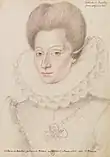
Catherine de Bourbon
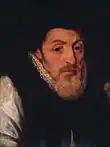
John Whitgift
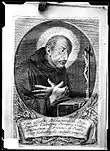
Gaspar de Bono

Hamida Banu Begum
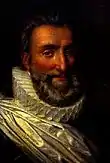
Ercole, Lord of Monaco
- January 4 – Ferenc Nádasdy, Hungarian noble (b. 1555)
- January 10 – Juliana of Lazarevo, Russian saint (b. 1530)
- January 17 – Santino Garsi da Parma, Italian musician (b. 1542)
- January 18 – Dorothy Catherine of Brandenburg-Ansbach, Burggräfin of Meissen (b. 1538)
- January 23 – Hyujeong, Korean Seon master (b. 1520)
- February 9 – Anne Russell, Countess of Warwick, wife of Ambrose Dudley, 3rd Earl of Warwick (b. 1548)
- February 10 – Cyriacus Spangenberg, German theologian and historian (b. 1528)
- February 13 – Catherine de Bourbon, French princess (b. 1559)
- February 24 – Christoph Pezel, German theologian (b. 1539)
- February 29 – John Whitgift, Archbishop of Canterbury from 1583 to his death (b. c. 1530)
- March 4 – Fausto Paolo Sozzini, Italian theologian (b. 1539)
- March 13 – Arnaud d'Ossat, French diplomat and writer (b. 1537)
- April 8 – Daniyal, Imperial Prince of the Timurid Dynasty, Viceroy of Deccan (b. 1572)
- April 14 – Ernest Frederick, Margrave of Baden-Durlach (1584–1604) (b. 1560)
- April 19 – Kuroda Yoshitaka, Japanese daimyō (b. 1546)
- April 21 – Koide Hidemasa, Samurai (b. 1539)
- April 25 – Pietro de' Medici, Italian noble (b. 1554)
- May 4 – Claudio Merulo, Italian composer (b. 1533)[99]
- May 13 – Christine of Hesse (b. 1543)
- May 22 – Peter Ernst I von Mansfeld-Vorderort, Governor of the Habsburg Netherlands (b. 1517)
- May 26 – Godfrey Goldsborough, English bishop (b. 1548)
- June 5 – Thomas Muffet, English naturalist and physician (b. 1553)
- June 10 – Isabella Andreini, Italian actress (b. 1562)
- June 21 – Jonathan Trelawny, English politician (b. 1568)
- June 24 – Edward de Vere, 17th Earl of Oxford, Lord Great Chamberlain of England, poet and possibly playwright (b. 1550)
- July 14 – Gaspar de Bono, Beatified Spanish Army veteran and Minim friar (b. 1530)
- August 3 – Bernardino de Mendoza, Spanish military commander
- August 8 – Horio Tadauji, Japanese warlord (b. 1578)
- August 12 – John I, Count Palatine of Zweibrücken (b. 1550)
- August 20 – Toda Kazuaki, Japanese samurai (b. 1542)
- August 29
- August 30 – John Juvenal Ancina, Italian Oratorian and bishop (b. 1545)
- September 10 – William Morgan, Welsh Bible translator (b. 1545)[100]
- September 12 – Louis Gunther of Nassau, Count of Nassau-Katzenelnbogen (b. 1575)
- September 17 – Lucas Osiander the Elder, German pastor (b. 1534)
- September 22 – Dorothy Stafford, English noble (b. 1526)
- September 23 – Gabriel Vásquez, Spanish theologian (b. 1549)
- October 8 – Janus Dousa, Dutch historian and noble (b. 1545)
- October 9
- October 18 – Igram van Achelen, Dutch statesman (b. 1528)
- October 22 – Domingo Báñez, Spanish theologian (b. 1528)
- October 24 – Za Dengel, Emperor of Ethiopia
- October 25 – Claude de La Trémoille, French noble (b. 1566)
- November – Thomas Storer, English poet (b. 1571)
- November 21 – John Thynne, English landowner and politician (b. 1555)
- November 23
- November 29 – Ercole, Lord of Monaco, Monegasque noble (b. 1562)
- December 30 – George Hastings, 4th Earl of Huntingdon, English nobleman (b. 1540)
- Thomas Churchyard, English author, secretary to Edward de Vere (b. 1520)
- Thomas North, English translator of Plutarch (b. 1535)
- Richard Topcliffe, English politician and torturer (b. 1531)
- Ma Shouzhen, Chinese courtesan, painter, poet, and composer (b. 1548)
1605
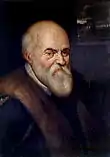
Ulisse Aldrovandi
- January 16 – Eitel Friedrich IV, Count of Hohenzollern (b. 1545)
- February 5 – Edward Stafford, English diplomat (b. 1552)
- February 15 – Maria of Hanau-Münzenberg, German noblewoman (b. 1562)
- February 19 – Orazio Vecchi, Italian composer (b. 1550)
- February 24 – Girolamo Simoncelli, Italian Catholic cardinal (b. 1522)
- February 26 – George III, Count of Erbach-Breuberg (1564–1605) (b. 1548)
- March 5 – Pope Clement VIII (b. 1536)[101]
- March 12 – King Alexander II of Kakheti (b. 1527)
- March 17 – Pieter Bast, Dutch cartographer, engraver and draftsman (b. 1550)
- April 5 – Adam Loftus, English Catholic archbishop (b. c. 1533)
- April 6 – John Stow, English historian and antiquarian (b. 1525)
- April 10 – Albrecht VII, Count of Schwarzburg-Rudolstadt (b. 1537)
- April 13 – Boris Godunov, Tsar of Russia (b. 1551)[102]
- April 14 – Francis Cherry, English diplomat (b. 1552)
- April 25 – Naresuan, Siamese King of Ayutthaya kingdom (b. c. 1555)
- April 27 – Pope Leo XI (b. 1535)[103]
- May 4 – Ulisse Aldrovandi, Italian naturalist (b. 1522)
- May 10 – Casimir VI, Duke of Pomerania, Lutheran Administrator of Cammin Prince-Bishopric (b. 1557)
- June 3 – Jan Zamoyski, Polish nobleman (b. 1542)[104]
- June 9 – John Louis II, Count of Nassau-Wiesbaden-Idstein (1596–1605) (b. 1596)
- June 20 – Tsar Feodor II of Russia (b. 1589)[28]
- July 2 – Louis I, Count of Sayn-Wittgenstein (1588–1605) (b. 1532)
- July 18 – Johann II, Duke of Saxe-Weimar, German duke (b. 1570)
- July 26 – Rev. Fr. Miguel de Benavides, O.P., Spanish clergyman and sinologist (b. 1552)
- August 2 – Richard Leveson, English admiral (b. c. 1570)
- August 4 – Charles I, Duke of Elbeuf, French duke and nobleman (b. 1556)
- September 9 – Heinrich Khunrath, German physician (b. 1560)
- September 11 – Sir Thomas Tresham, English politician (b. 1550)
- September 14 – Jan Tarnowski, Archbishop of Kraków (b. 1550)
- September 19 – Edward Lewknor, English politician (b. 1542)
- September 23 – Pontus de Tyard, French poet (b. c. 1521)
- September 24 – Manuel Mendes, Portuguese composer (b. 1547)
- October 13 – Theodore Beza, French theologian (b. 1519)
- October 18 – Beate Clausdatter Bille, Danish noblewoman (b. 1526)
- October 22 – King Constantine I of Kakheti (b. 1567)
- October 27 – Akbar The Great, Mughal emperor (b. 1542)
- October 30 – George Clifford, 3rd Earl of Cumberland, English noble (b. 1558)
- October 31 – Dorothy Bray, Baroness Chandos, English noble (b. 1524)
- November 5 – Nyaungyan Min, Burmese king (b. 1555)
- November 8 – Robert Catesby, English conspirator (b. 1573)
- November 12 – Jan Tomasz Drohojowski, Polish noble (b. 1535)
- November 14 – Anna Maria of Anhalt, German noblewoman (b. 1561)
- December – Francis Tresham, English conspirator (b. 1567)
- December 3 – Guy XX de Laval, French noble (b. 1585)
- December 6 – Murai Nagayori, Japanese samurai (b. 1543)
- December 25 – Marino Grimani, Doge of Venice (b. 1532)
- December 29 – John Davis, English explorer (b. 1550)
- Marek Sobieski, Polish nobleman (b. 1549)
1606
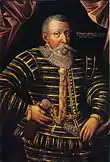
Bogislaw XIII, Duke of Pomerania
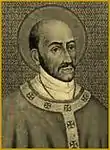
Turibius of Mogrovejo
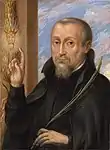
Henry Garnet
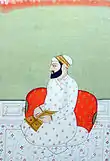
Guru Arjan
- January 4 – George Villiers, English knight (b. 1544)
- January 6 – Antonio Fernández de Córdoba y Cardona, Spanish diplomat (b. 1550)
- January 11 – Arnold III, Count of Bentheim-Steinfurt-Tecklenburg-Limburg, Lord of Rheda (b. 1554)
- January 20 – Sibylle Elisabeth of Württemberg, Duchess consort of Saxony (b. 1584)
- January 29 – Edward Tyrrell, English politician (b. 1551)
- January 30
- January 31
- February 21 – Richard Field, English Jesuit (b. 1554)
- March 2 – Martin Moller, German poet and mystic (b. 1547)
- March 6 – Philip of Hohenlohe-Neuenstein, Dutch army commander (b. 1550)
- March 7 – Bogislaw XIII, Duke of Pomerania-Stettin from 1603 to 1606 (b. 1544)
- March 10 – Emperor Yaqob of Ethiopia (killed in battle)
- March 15 – Balthasar von Dernbach, Prince-Abbot of Fulda (b. 1548)
- March 16 – Gaspar de Zúñiga y Acevedo, Count of Monterrey, Spanish colonial administrator and Viceroy of Mexico (b. 1540)
- March 23
- March 25 – François de Bar, French scholar (b. 1538)
- April 3 – Charles Blount, 1st Earl of Devon, English politician (b. 1563)
- April 7 – Edward Oldcorne, English martyr (b. 1561)
- April 16 – John Addey, English shipwright (b. 1550)
- May 3 – Henry Garnet, English Jesuit (executed) (b. 1555)
- May 17
- False Dmitriy I, pretender to the Russian throne (b. 1582)
- Niccolò Orlandini, Italian Jesuit writer (b. 1554)
- May 22 – José de Sigüenza, Spanish theologian (b. 1544)
- May 30 – Guru Arjan Dev, fifth of the Sikh gurus (executed) (b. 1563)
- July 7 – Christopher, Duke of Brunswick-Harburg, co-ruler of Brunswick-Lüneburg-Harburg (1603–1606) (b. 1570)
- July 28 – Antonio de Raya Navarrete, Spanish Catholic prelate who served as Bishop of Cuzco (1594–1606) (b. 1536)
- September 2 – Karel van Mander, Dutch painter and poet (b. 1548)
- September 3 – Juan de Borja y Castro, Spanish noble (b. 1533)
- September 9 – Leonhard Lechner, German composer and music editor (b. 1553)
- September 28 – Nicolaus Taurellus, German philosopher and theologian (b. 1547)
- October 5 – Philippe Desportes, French poet (b. 1546)
- October 8 – Johann VI, Count of Nassau-Dillenburg (b. 1536)
- November 8 – Girolamo Mercuriale, Italian philologist and physician (b. 1530)
- November 16 – Alderano Cybo-Malaspina, Italian nobleman (b. 1552)
- November 20 – (burial date) John Lyly, English writer (b. 1553)
- December 29 – Stephen Bocskay, Prince of Transylvania (b. 1557)
- Date unknown – Akaza Naoyasu, Japanese nobleman
1607

Anne Morgan, Baroness Hunsdon
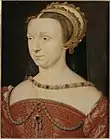
Anna d'Este

Martim Afonso de Castro

Caesar Baronius
- January 6 – Guidobaldo del Monte, Italian mathematician, astronomer and philosopher (b. 1545)
- January 12 – Mihály Káthay, Hungarian politician (b. c. 1565)
- January 19 – Anne Morgan, Baroness Hunsdon, English Baroness (b. 1529)
- January 25 – Anders Foss, Norwegian bishop (b. 1543)
- January 27 – Richard Lowther, English soldier and official (b. 1532)
- March 11 – Giovanni Maria Nanino, Italian composer (b. c. 1543)
- March 29 – Tsugaru Tamenobu, Japanese daimyō (b. 1550)
- March 31 – Henry Beaumont, English landowner and MP (b. 1545)
- April 6 – Jan Saenredam, Dutch engraver (b. 1565)
- April 9 – Eleanor of Prussia, daughter of Duke Albert Frederick of Prussia; by marriage Electress of Brandenburg (b. 1583)
- April 15
- April 27 – Edward Cromwell, 3rd Baron Cromwell, Governor of Lecale (b. 1560)
- May – Edward Dyer, English courtier and poet (b. 1543)
- May 3 – Agnes Douglas, Countess of Argyll, Scottish noblewoman (b. 1574)
- May 17 – Anna d'Este, French princess (b. 1531)
- May 21 – John Rainolds, English scholar and Bible translator (b. 1549)
- May 25 – Mary Magdalene de' Pazzi, Italian Carmelite nun and mystic (b. 1566)
- June 2 – Yūki Hideyasu, daimyō (b. 1574)
- June 3 – Martim Afonso de Castro, Portuguese Viceroy of India (b. 1560)
- June 7 – Johannes Matelart, composer (b. c. 1538)
- June 10 – John Popham, Lord Chief Justice of England (b. 1531)
- June 19
- Johannes Bertelius, Luxembourgian historian (b. 1544)
- Patriarch Job of Moscow
- June 28 – Domenico Fontana, Italian architect (b. 1543)
- June 30 – Caesar Baronius, Italian cardinal and historian (b. 1538)
- July 6 – Achille Gagliardi, Italian philosopher and theologian (b. 1537)
- July 7 – Penelope Blount, Countess of Devonshire, English noblewoman (b. 1563)
- July 12 – Thomas Legge, British writer (b. 1535)
- July 24 – Alessandro Pieroni, Italian painter (b. 1550)
- July 29 – Alexander Chocke of Avington, English politician (b. 1566)
- August 1 – Otto Casmann, German philosopher (b. 1562)
- August 22 – Bartholomew Gosnold, English explorer and privateer (b. 1571)
- August 29 – Ercole Sassonia, Italian physician (b. 1551)
- September 5 – Pomponne de Bellièvre, French politician (b. 1529)
- September 10 – Luzzasco Luzzaschi, Italian composer (b. 1545)
- September 16 – Mary Stuart, English-Scottish princess (b. 1605)
- September 22 – Alessandro Allori, Italian portrait painter of the late Mannerist Florentine school (b. 1535)
- October 16 – Hōzōin In'ei, Japanese Buddhist teacher (b. 1521)
- October 31 – Wawrzyniec Grzymała Goślicki, Polish philosopher (b. 1530)
- November 7 – Ana de Velasco y Girón, Mother of King John IV of Portugal (b. 1585)
- November 8 – Elisabeth of Anhalt-Zerbst, Electress of Brandenburg (b. 1563)
- November 24 – Juan de la Cerda, 6th Duke of Medinaceli, Spanish noble (b. 1569)
- December 20 – Sir John Bourke of Brittas, Irish recusant, hanged (b. 1550)
- December 31 – Edmund Shakespeare, English actor, brother of William Shakespeare (b. 1580)
- date unknown – Henry Chettle, English writer (b. 1564)
1608
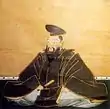
Tsugaru Tamenobu died 29 March
.jpg.webp)
Frederick I, Duke of Württemberg died 29 January

Francis Caracciolo died 4 June
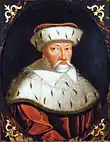
Joachim III Frederick, Elector of Brandenburg died 18 July
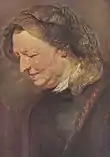
Maria Pypelinckx died 19 October
- January 4 – Peter Edgcumbe, English politician (b. 1536)
- January 18 – Jacques Couet, French pastor (b. 1546)
- January 19 – Bernard Maciejowski, Polish Catholic archbishop (b. 1548)
- January 28 – Enrique Henríquez, Portuguese theologian (b. 1536)
- January 29 – Frederick I, Duke of Württemberg, son of George of Mömpelgard and his wife Barbara of Hesse (b. 1557)
- February 13 – Konstanty Wasyl Ostrogski, Lithuanian prince (b. 1526)
- February 13 – Bess of Hardwick, Countess of Shrewsbury (b. 1527)
- February 26 – John Still, English Bishop of Bath and Wells, famed as a preacher (b. c. 1543)
- February 27 – Henri, Duke of Montpensier, French noble (b. 1573)
- March 12 – Kōriki Kiyonaga, Japanese warlord (b. 1530)
- March 16 – Seonjo of Joseon, King of Joseon (b. 1552)
- March 29
- April 8 – Magdalen Dacre, English noble (b. 1538)
- April 9 – Pomponio Torelli, Italian writer (b. 1539)
- April 18 – Jakob Christoph Blarer von Wartensee, Roman Catholic bishop (b. 1542)
- April 19 – Thomas Sackville, 1st Earl of Dorset, English statesman and poet (b. 1536)
- April 29 – Maria Anna of Bavaria (b. 1551)
- May 11 – Giovanni Luca Conforti, Italian composer and singer (b. 1560)
- May 14 – Charles III, Duke of Lorraine (b. 1542)
- May 15 – Archibald Napier, Scottish landowner (b. 1534)
- May 22 – Juan Bautista Villalpando, Spanish architect and mathematician (b. 1552)
- June 1 – Marie Eleonore of Cleves, Duchess consort of Prussia (1573–1608) (b. 1550)
- June 4 – Francis Caracciolo, Italian Catholic priest (b. 1563)
- June 5 – Ippolito Andreasi, Italian painter (b. 1548)
- June 19
- July 3 – William Barclay, Scottish academic lawyer (b. 1546)
- July 18 – Joachim Friedrich, Elector of Brandenburg (b. 1546)
- July 25 – Pomponio Nenna, Italian composer (b. 1556)
- July 30 – Rory O'Donnell, 1st Earl of Tyrconnell (b. 1575)
- August 13 – Giambologna, Italian sculptor (b. 1529)
- September 4 – Juan de Zúñiga y Avellaneda, Spanish nobleman (b. 1551)
- September 8 – Jerónimo Xavierre, Spanish cardinal (b. 1546)
- September 14 – Christoph Schissler, German scientific instrument maker (b. 1531)
- September 20 – Kanamori Nagachika, Japanese samurai (b. 1524)
- September 28 – Henri, Duke of Joyeuse, French general (b. 1563)
- October 11 – Giovanni Ambrogio Figino, Italian painter (b. c. 1549)
- October 17 – Luca Bati, Italian composer (b. 1546)
- October 19
- October 26 – Philipp Nicolai, German Lutheran pastor (b. 1556)
- October 29 – John Smith, English politician (b. 1557)
- November 24 – Giovanni Battista Giorgi, Italian Catholic prelate who served as Bishop of Ston (1606–1608) (b. 1536)
- December 21 – William Davison, secretary to Queen Elizabeth I of England (b. c. 1541)
- December 29 – Martin Schalling the Younger, German theologian (b. 1532)
- George Bannatyne, collector of Scottish poems (b. 1545)
1609
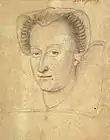
Isabelle de Limeuil
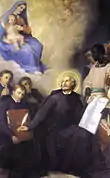
John Leonardi
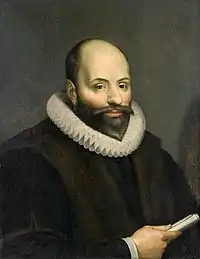
Jacobus Arminius
- January – Thomas East, English printer (born c. 1540)
- January 9 – Joannes Bochius, civic officeholder and neo-Latin poet in the city of Antwerp (b. 1555)
- January 21 – Joseph Justus Scaliger, French Protestant scholar (b. 1540)
- February 17 – Ferdinando I de' Medici, Grand Duke of Tuscany (b. 1549)
- February 28 – Paul Sartorius, German composer (b. 1569)
- March – James Hamilton, 3rd Earl of Arran (b. c. 1537)
- March 9 – William Warner, English poet (b. c. 1558)
- March 17 – Olaus Martini, Swedish Archbishop of Uppsala (b. 1557)
- March 22 – Al-Jilani, Persian physician
- March 25
- April 4 – Charles de L'Ecluse, Flemish botanist (b. 1526)
- April 6 – Merkelis Giedraitis, Lithuanian bishop (b. 1536)
- April 8 – Mark Kerr, 1st Earl of Lothian, Scottish statesman (b. 1553)
- April 9 – William Overton, English bishop (b. 1525)
- April 11 – John Lumley, 1st Baron Lumley, English Baron (b. 1533)
- April 14 – Gasparo da Salò (Gasparo Bertolotti), Italian violin maker(b. 1540)
- May 15 – Giovanni Croce, Italian composer (b. 1557)
- May 19
- June 15 – Yamada Arinobu, Japanese nobleman (b. 1544)
- July 15 – Annibale Carracci, Italian Baroque painter (b. 1560)
- July 20 – Federico Zuccari, Italian painter (b. 1543)
- August 4 – Cecily Bulstrode, English courtier (b. 1584)
- August 7 – Eustache Du Caurroy, French composer (b. 1549)[107]
- August 6 – André du Laurens, French physician (b. 1558)
- August 28 – Francis Vere, English soldier (b. c. 1560)
- September 2 – Thomas Scrope, 10th Baron Scrope of Bolton, English general (b. 1567)
- September 3 – Jean Richardot, Belgian diplomat (b. 1540)
- September 17 – Maharal of Prague, Jewish mystic and philosopher (b. 1525)
- September 29 – Ebba Lilliehöök, Swedish countess (b. 1529)
- October 1 – Giammateo Asola, Italian composer (b. c. 1532)
- October 9 – John Leonardi, Italian founder of the Clerks Regular of the Mother of God of Lucca (b. 1541)
- October 16 – Dorothea Hedwig of Brunswick-Wolfenbüttel, Princess of Anhalt-Zerbst (b. 1587)
- October 19 – Jacobus Arminius, Dutch Reformed theologian (b. 1560)[108]
- December – Barnabe Barnes, English poet (b. c. 1571)[109]
- December 4 – Alexander Hume, Scottish poet (b. 1560)
- December 16 – Arild Huitfeldt, Danish historian (b. 1546)
References
- Williams, Hywel (2005). Cassell's Chronology of World History. London: Weidenfeld & Nicolson. pp. 238–243. ISBN 0-304-35730-8.
- Hilary Gatti (2002). Giordano Bruno: Philosopher of the Renaissance. Ashgate. p. 7. ISBN 978-0-7546-0562-1.
- "Historical Events for Year 1600 | OnThisDay.com". Historyorb.com. Retrieved 2018-04-05.
- John Glenn Paton (1994). Italian Arias of the Baroque and Classical Eras: High. Alfred Music Publishing. p. 10. ISBN 978-0-7390-2191-0.
- P. W. Hasler (1981). The House of Commons, 1558-1603: Members, D-L. History of Parliament Trust. p. 17. ISBN 978-0-11-887501-1.
- "First Voyage of the English East India Company, in 1601, under the Command of Captain James Lancaster". Retrieved 2021-02-08.
- Palmer, Alan; Veronica (1992). The Chronology of British History. London: Century Ltd. pp. 166–168. ISBN 0-7126-5616-2.
- Edwards, Phillip, ed. (1985). Hamlet, Prince of Denmark. New Cambridge Shakespeare. Cambridge University Press. p. 8. ISBN 0-521-29366-9.
Any dating of Hamlet must be tentative.
Scholars date its writing as between 1599 and 1601. - Shakespeare, William (2001). Smith, Bruce R. (ed.). Twelfth Night: Texts and Contexts. Boston, Mass: Bedford/St Martin's. p. 2. ISBN 0-312-20219-9.
- Penguin Pocket On This Day. Penguin Reference Library. 2006. ISBN 0-14-102715-0.
- Weir, Alison (1999), Elizabeth the Queen, London: Pimlico, p. 486, ISBN 978-0-7126-7312-9
- "Historical Events for Year 1603 | OnThisDay.com". Historyorb.com. Retrieved 2018-04-05.
- Des Sauvages: ou voyage de Samuel Champlain, de Brouages, faite en la France nouvelle l'an 1603.
- Jose Eugenio Borae. "The massacre of 1603: Chinese perception of the Spaniards in the Philippines" (PDF). Homepage.ntu.edu.tw. Retrieved 2016-01-09.
- Turnbull, Stephen (2013). "The ghosts of Amakusa: localised opposition to centralised control in Higo Province, 1589–1590". Japan Forum. Taylor & Francis. 25 (2): 191–211. doi:10.1080/09555803.2012.745586. S2CID 144893702.
- Asimov, Isaac. Asimov's Biographical Encyclopedia of Science and Technology (2nd ed.).
- Martin Butler, The Stuart Court Masque and Political Culture (Cambridge, 2008), p. 63.
- George Chapman; Ben Jonson; John Marston (1979). Eastward Ho. Manchester University Press. p. 18. ISBN 978-0-7190-1514-4.
- "SN 1604, Kepler's Supernova". Archived from the original on January 31, 2010. Retrieved 2011-06-22.
- "Three Great Eyes on Kepler's Supernova Remnant". NASA. Archived from the original on November 1, 2012. Retrieved 2011-06-22.
- Lever, J. W., ed. (1967) [1965]. Measure for Measure. The Arden Shakespeare, second series. Bloomsbury Publishing. p. xxxi. doi:10.5040/9781408160237.00000030. ISBN 978-1-9034-3644-8 – via Drama Online Library.
- The exact date is unknown, but a surviving account book for the year ended September 30 1604 proves it was built within the preceding 12 months.
- R. M. Flores (1982). Sancho Panza Through Three Hundred Seventy-five Years of Continuations, Imitations, and Criticism, 1605-1980. Juan de la Cuesta. p. 1. ISBN 978-0-936388-06-9.
- Moody, T. W.; et al., eds. (1989). A New History of Ireland. 8: A Chronology of Irish History. Oxford University Press. ISBN 978-0-19-821744-2.
- Recusant History. Catholic Record Society. 1964. p. 79.
- Torilla tavataan! Oulun rikas kulttuuritarjonta hellii matkailijaa, sillä tapahtumia ja festivaaleja on tarjolla läpi vuoden – Seura (in Finnish)
- Tyler Lansford (17 July 2009). The Latin Inscriptions of Rome: A Walking Guide. JHU Press. p. 513. ISBN 978-0-8018-9149-6.
- Political History and Culture of Russia. Nova Science Publishers. 2001. p. 237.
- Timeline of History. DK Publishing. 2011. p. 203. ISBN 978-0-7566-8681-9.
- Christopher Culpin (1997). Crime and Punishment Through Time: A Study in Development in Crime, Punishment and Protest for SHP and Other GCSE Syllabuses. Collins Educational. p. 45. ISBN 978-0-00-327321-2.
- "Huguenot Timeline". Genealogy Forum. Armada, Michigan. January 2006. Archived from the original on January 17, 2012. Retrieved November 19, 2013.
- Guy Eden (1949). The Parliament Book. Staples Press. p. 29.
- McHugh, Evan (2006). 1606: An Epic Adventure. Sydney: University of New South Wales Press. p. 20. ISBN 978-0-86840-866-8.
- Richardson, William A. R. (2008). Was Australia Charted Before 1606: the Jave la Grande Inscriptions. Australia: Everbest. p. 20.
- Scholars date completion as between 1603 and 1606. Boyce, Charles (1990). Encyclopaedia of Shakespeare. New York: Roundtable Press.
- HS: Kaarle IX perusti Vaasan 1606 (in Finnish)
- Evelyn Wrench; Sir Evelyn Wrench (1949). Transatlantic London: Three Centuries of Association Between England and America. Hutchinson. p. 5.
- Royal Commission on the Ancient and Historical Monuments and Constructions in Wales and Monmouthshire (1917). An Inventory of the Ancient Monuments in Wales and Monmouthshire: County of Carmarthen. V. RCAHMW. p. 245.
- BBC staff (24 September 2014). "The great flood of 1607: could it happen again?". BBC Somerset. Retrieved 20 February 2008.
- David Clarke; Eric Clarke (28 July 2011). Music and Consciousness: Philosophical, Psychological, and Cultural Perspectives. OUP Oxford. p. 345. ISBN 978-0-19-162558-9.
- Roger Quarm (1992). The Ship. Scala Books. p. 23. ISBN 978-1-85759-010-4.
- de Raxis de Flassan, Gaëtan (1811). Histoire générale et raisonnée de la diplomatie française ou de la politique de la France depuis la fondation de la monarchie jusqu'à la fin du règne de Louis XVI. Vol. 2. Paris: Treuttel et Würtz. p. 258 – via Google Books.
- Philip Caraman (1985). The Lost Empire: The Story of the Jesuits in Ethiopia, 1555-1634. Sidgwick & Jackson. p. 60. ISBN 978-0-283-99254-4.
- Samuel Lythe, The Economy of Scotland in Its European Setting, 1550-1625 (Edinburgh, 1960), pp. 55-6.
- Arthur M. Woodford (1991). Charting the Inland Seas: A History of the U.S. Lake Survey. U.S. Army Corps of Engineers, Detroit District. p. 3. ISBN 978-0-8143-2499-8.
- Grass, Gary C. (2000). "First Germans at Jamestown". German Corner. Davitt Publications. Archived from the original on January 25, 2017. Retrieved 2019-06-22.
- Muhammad Riaz (1992). Serials Management in Libraries. Atlantic Publishers & Dist. p. 5. ISBN 978-81-7156-332-6.
- Hunter, Douglas (2009). Half Moon: Henry Hudson and the voyage that redrew the map of the New World. London: Bloomsbury Press. ISBN 978-1-59691-680-7.
- Kenneth R. Lang (3 March 2011). The Cambridge Guide to the Solar System. Cambridge University Press. p. 15. ISBN 978-1-139-49417-5.
- Nevius, Michelle; James (2008-09-08). "New York's many 9/11 anniversaries: the Staten Island Peace Conference". Inside the Apple: A Streetwise History of New York City. Retrieved 2011-10-25.
- Juet, Robert (1625). "Juet's Journal of Hudson's 1609 Voyage". In Purchas, Samuel (ed.). Hakluytus Posthumus, or Purchas his Pilgrimes. Vol. 4.
- In Deuteromelia or The Seconde part of Musicks melodie.
- Opie, Iona; Peter (1997). The Oxford Dictionary of Nursery Rhymes (2nd ed.). Oxford University Press. p. 306. ISBN 0-19-860088-7.
- Jerzy Jan Lerski; George J. Lerski; Halina T. Lerski (1996). Historical Dictionary of Poland, 966-1945. Greenwood Publishing Group. p. 90. ISBN 978-0-313-26007-0.
- Alexandre Koyré (1 January 1992). The Astronomical Revolution: Copernicus, Kepler, Borelli. Courier Corporation. p. 438. ISBN 978-0-486-27095-1.
- Pedro Calderón de la Barca (1986). Love is No Laughing Matter. Oxford University Press. p. 7. ISBN 978-0-85668-365-7.
- The New Schaff-Herzog Encyclopedia of Religious Knowledge. Baker Book House. 1977. p. 135. ISBN 978-0-8010-7947-4.
- "Grenville, Sir Richard (1600–1659), of Fitzford, nr. Tavistock, Devon". History of Parliament Online. Retrieved 21 August 2020.
- David Mathew (1955). Scotland Under Charles I. Eyre & Spottiswoode. p. 26. ISBN 978-7-470-00028-0.
- "Anne of Austria | queen of France". Encyclopedia Britannica. Retrieved 29 June 2020.
- "Louis XIII | king of France". Encyclopedia Britannica. Retrieved 9 June 2019.
- David J. Sturdy (24 September 2003). Richelieu and Mazarin: A Study in Statesmanship. Macmillan International Higher Education. p. 87. ISBN 978-1-4039-4392-7.
- David E. Newton (2003). Encyclopedia of Air. Greenwood Press. p. 138. ISBN 978-1-57356-564-6.
- Davida Rubin (1991). Sir Kenelm Digby, F.R.S., 1603-1665: A Bibliography Based on the Collection of K. Garth Huston, Sr., M.D. Norman Publishing. p. 12. ISBN 978-0-930405-29-8.
- John Gwynn Williams. "Vaughan, Syr John (1603-1674), barnwr". Y Bywgraffiadur Cymreig (in Welsh). Retrieved 1 July 2021.
- James Bentley (1991). The Gateway to France: Flanders, Artois and Picardy. Viking. p. 156. ISBN 978-0-670-83206-4.
- Burns, D. Thorburn; Müller, R. Klaus; Salzer, Reiner; Werner, Gerhard (2014). Important Figures of Analytical Chemistry from Germany in Brief Biographies: From the Middle Ages to the Twentieth Century. Springer. p. 16. ISBN 978-3-319-12151-2.
- "Charles III (or IV) | duke of Lorraine [1604–1675]". Encyclopedia Britannica. Retrieved 20 September 2021.
- Roberts, Stephen K (January 2008). "Davies, Francis (1605–1675), bishop of Llandaff". Oxford Dictionary of National Biography (online ed.). Oxford University Press. doi:10.1093/ref:odnb/7235. Retrieved 17 September 2008. (Subscription or UK public library membership required.)
- John Landwehr (1971). Splendid Ceremonies; State Entries and Royal Funerals in the Low Countries, 1515-1791: A Bibliography. De Graaf. p. 5. ISBN 978-90-6004-287-8.
- Lassner, Martin (18 July 2011). "Johann Rudolf Stadler". Dictionnaire historique de la Suisse (DHS) (in French). Retrieved 13 April 2020.
- The Pilgrim of Our Lady of Martyrs. Shrine of Our Lady of Martyrs. 1902. p. 240.
- Charles L. Mee Jr. (24 October 2016). Rembrandt: A Life. New Word City. p. 8. ISBN 978-1-61230-700-8.
- Britannica.
- Petrus Johannes Blok (1975). The Life of Admiral de Ruyter. Greenwood Press. p. 9. ISBN 978-0-8371-7666-6.
- Dorothy McDougall (1938). Madeleine de Scudéry: Her Romantic Life and Death. Methuen & Company, Limited. p. 5.
- New Haven Colony Historical Society, New Haven (1900). Papers. pp. 340–342.
- Academic American Encyclopedia. Aretê Publishing Company. 1980. p. 446. ISBN 9780933880443.
- Raymond Renard Butler (1947). Scientific Discovery. English Universities Press. p. 194.
- East Riding Antiquarian Society (Yorkshire) (1904). The Transactions of the East Riding Antiquarian Society. The Society. p. 92.
- Joseph Milton French (1966). The Life Records of John Milton: 1608-1639. Gordian Press. p. 1.
- University of Nebraska (Lincoln campus). Graduate College (1953). Abstracts of Doctoral Dissertations. University of Nebraska. p. 136.
- Richard Lawrence Ollard (1988). Clarendon and His Friends. Atheneum. p. 362. ISBN 978-0-689-11731-2.
- Encyclopedia Americana: Franco to Goethals. Scholastic Library Pub. 2006. p. 26. ISBN 978-0-7172-0139-6.
- Frima Fox Hofrichter (1989). Judith Leyster: A Woman Painter in Holland's Golden Age. Davaco. p. 13. ISBN 978-90-70288-62-4.
- The Gentleman's Magazine and Historical Review. AMS Press. 1968. p. 594.
- Hans Blumenberg (1985). The Legitimacy of the Modern Age. MIT Press. p. 549. ISBN 978-0-262-52105-5.
- Virginia Brown; James Hankins; Robert A. Kaster (May 2003). Catalogus Translationum Et Commentariorum: Medieval and Renaissance Latin Translations and Commentaries : Annotated Lists and Guides. CUA Press. p. 168. ISBN 978-0-8132-1300-2.
- William Oxenham Hewlett (1882). Notes on Dignities in the Peerage of Scotland which are Dormant Or which Have Been Forfeited. Wildy and Sons. p. 135.
- Alexander Chalmers (1816). The General Biographical Dictionary Containing an Historical and Critical Account of the Lives and Writings of the Most Eminent Persons. J. Nichols. p. 292.
- Encyclopedia of World Biography: Kilpatrick-Louis. Gale Research. 1998. p. 314. ISBN 978-0-7876-2549-8.
- Diego Alonso-Lasheras SJ (11 April 2011). Luis de Molina's De Iustitia et Iure: Justice as Virtue in an Economic Context. BRILL. p. 14. ISBN 978-90-04-20966-4.
- Arthur F. Kinney (1973). Titled Elizabethans: A Directory of Elizabethan State and Church Officers and Knights, with Peers of England, Scotland, and Ireland, 1558-1603. Archon Books. p. 37. ISBN 978-0-208-01334-7.
- Biographical Register of Christ's College, 1505-1905, and of the Earlier Foundation, God's House, 1448-1505. CUP Archive. 1910. p. 41.
- John Robert Christianson (2003). On Tycho's Island: Tycho Brahe, Science, and Culture in the Sixteenth Century. Cambridge University Press. p. 277. ISBN 978-0-521-00884-6.
- David Mason Greene; Constance Green (1985). Greene's Biographical Encyclopedia of Composers. Reproducing Piano Roll Fnd. p. 78. ISBN 978-0-385-14278-6.
- Chisholm, Hugh, ed. (1911). . Encyclopædia Britannica. Vol. 04 (11th ed.). Cambridge University Press. p. 154.
...he died on the 30th of October 1602
- "Elizabeth I | Biography, Facts, Mother, & Death". Encyclopedia Britannica. Retrieved 22 March 2019.
- John Morehen (1 January 2000). Ricercari d'intavolatura d'organo: 1567. A-R Editions, Inc. p. 9. ISBN 978-0-89579-476-5.
- Glanmor Williams. "Morgan, William (c.1545-1604)". Y Bywgraffiadur Cymreig (in Welsh). Retrieved 4 July 2021.
- "Clement VIII | pope". Encyclopedia Britannica. Retrieved 14 January 2021.
- Robert Auty; Dimitri Obolensky (16 July 1981). Companion to Russian Studies: Volume 1: An Introduction to Russian History. Cambridge University Press. p. 105. ISBN 978-0-521-28038-9.
- "Leo XI | pope". Encyclopedia Britannica. Retrieved 6 May 2019.
- Trevor Nevitt Dupuy; Curt Johnson; David L. Bongard (1992). The Harper Encyclopedia of Military Biography. HarperCollins. p. 829. ISBN 978-0-06-270015-5.
- Faith Nostbakken; William Shakespeare (1997). Understanding Macbeth: A Student Casebook to Issues, Sources, and Historical Documents. Greenwood Publishing Group. p. 67. ISBN 978-0-313-29630-7.
- Günther, Hans-Jürgen, Der Humanist Johannes Pistorius – Gründer des „Gymnasium Illustre“ zu Durlach, Markgrafen-Gymnasium Karlsruhe Durlach, Jahresbericht 1993/94, Durlach 1994.
- Robert Chase (8 September 2004). Dies Irae: A Guide to Requiem Music. Scarecrow Press. p. 53. ISBN 978-0-585-47162-4.
- Hugo Grotius (1995). Hugo Grotius, Ordinum Hollandiae AC Westfrisiae Pietas (1613): Critical Edition with English Translation and Commentary. BRILL. p. 16. ISBN 90-04-10385-6.
- D. L. Kirkpatrick (1991). Reference Guide to English Literature: Introductions ; Writers A-G. St. James Press. p. 216. ISBN 978-1-55862-078-0.
This article is issued from Wikipedia. The text is licensed under Creative Commons - Attribution - Sharealike. Additional terms may apply for the media files.

